JEWISH WOMEN’S CONSERVATIVE FORUM
Like-minded women form a club to bond over their conservative political views

Like-minded women form a club to bond over their conservative political views
Rise Stillman was 14 when she was transported to Auschwitz in April 1944, a day after Passover ended.
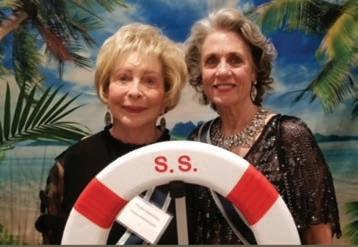
“I recall seeing a train that was so long, and I had no idea where we were going. There were Hungarian and German soldiers shouting, screaming and pushing us into cattle cars. There must have been about 70 people in each car and there was hardly any space — it was horrible. I recall once they shut the doors, I was just in shock. Then darkness set in and the only light we had was the little vents at the top of the car,” she told Jewish News.
The trip took three nights, it was hot and there were no sanitary facilities, only a couple of buckets to use as a toilet. The train stopped periodically, picking up more Jews from other ghettos. People would yell out of the vents, pleading for water but the guards either ignored them or threw a bucket of water in their faces.
She remembers the stench and the sounds of people crying, soldiers shouting and dogs barking.
“We were complaining on the train how horrible the conditions were but we never had an idea that an even worse fate was waiting,” she recalled.
After being hurried off the train into one of the infamous selection lines, she was “one of the lucky ones,” chosen to work, tattooed and given a uniform dress, one she would wear the rest of the war. Supper was a piece of bread and broth. In the barracks, she slept on a very thin layer of straw, without a pillow or blanket.
“The sanitary conditions were horrible. We didn’t even have a piece of soap or a towel to wash and dry your face.”
Domestic abuse victims can bring their pets to JFCS’ Sojourner Center
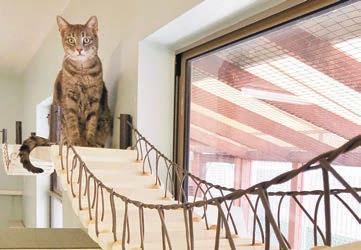
In late February, the U.S. Government Accountability Office (GAO), an independent and nonpartisan government agency, released a report stating that domestic terrorism increased by 357% in the last decade and found that racially or ethnically motivated extremists committed the most violent incidents.
During roughly the same period, most Jewish Americans say they have witnessed a dramatic rise in antisemitism and many have been affected personally, according to Pew Research.
In short, extremism is in the news and on the minds of Greater Phoenix’s Jewish community. The last week of March, a few extremism experts were in Scottsdale to talk about the reality of the danger, what’s being done and why there is reason for optimism.

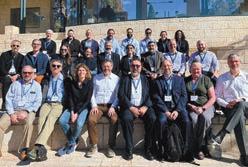
Oren Segal, vice president of the Anti-Defamation League’s (ADL) Center on Extremism, spoke at the Ina Levine Jewish Community Campus on March 29 in the first community-wide, in-person event ADL Arizona has hosted in five years.

Though he opened his talk with a bit of gallows humor — “I’m used to showing up, seeing a lovely, relaxed, seemingly pleasant audience and then sucking the air right out of the room” SEE EXTREMISM, PAGE 3
“Jewish Matchmaking,” is a new Netflix series set to start streaming May 3. See page 10. PHOTO COURTESY OF
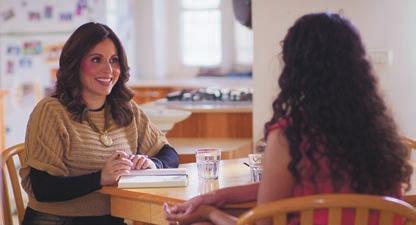
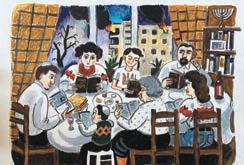
— he didn’t stay there long. Instead, he spent his hour-long lecture letting people know what his team of antisemitism and anti-extremism experts is actually doing to make things better.
Gathering data is a big component of achieving that goal, and social media — where many purveyors of hate are the most effective and have the greatest reach — is a data goldmine.
Segal’s team of analysts and investigators is online around the clock to understand where threats are brewing and to understand the symbols and narratives that animate extremists enough to motivate them to actually commit a hate crime, whether it’s a violent assault or a seemingly passive flyering filled with antisemitic and racist rhetoric.
Segal touted ADL’s use of technology to combat extremism. For example, the organization has developed an application to go through thousands of hours of hatefilled podcasts and other media looking for keywords to flag for analysis, something that saves his team literally years of work.
“We’re not just allowing extremists to exploit technology; we’re using it against them as well,” Segal said.
The ADL also shares its technology and expertise with businesses and law enforcement to help empower them to do more to deter and detain extremists.
Segal recounted an incident in which three men beat up a Jewish student in Orlando during a white supremacist rally last year. From their offices, his team was able to see what was happening in real time, record it and give background on the three offenders to local sheriffs, who then used that information to arrest the men and charge them with hate crimes.
Segal gave a brief overview of instances in which his team tracked extremists targeting immigrants and Jews and planning attacks against them. Again, his team shared information they had gathered and these criminals were arrested before they carried out the attacks. While people don’t hear about threats that were stopped in time, they should know those examples are legion, he said.
“That is our bread and butter, that is what we do and we do it better than anybody else,” he said.
Another tactic is to cut off would-be terrorists at the knees financially by going after their crowdfunding platforms. Segal showed the video feed from Tim Gionet’s phone as he trespassed the U.S. Capitol during the insurrection on Jan. 6, 2021. Gionet is a right-wing extremist social media personality known as Baked Alaska, who was arrested for assault in Scottsdale in 2020.
Segal pointed out that on the recording, one could see that people were watching and suggesting actions he could take, as well as paying him in real time. Violent extremism has become a form of entertain-
ment — one that pays, he said. Agreements with PayPal and other financial companies allow the ADL to scale its work to go after funding for hate.
Additionally, other Jewish communal security organizations — as well as those representing other marginalized groups — embed people with Segal’s team to learn best practices. Earlier in the week, ADL announced a partnership with the Community Security Initiative, which coordinates security for local Jewish institutions in the New York area and the local branch of the Community Security Service, whose main mission is to train volunteer security patrols at synagogues.
“I have a dream that we may one day have 50 analysts from all sorts of national organizations embedded with us and, maybe one day, there’s somebody here in Arizona embedded on my team. This enables us to have a greater impact,” he said.
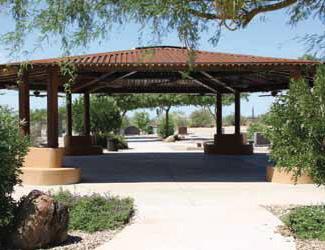

The next night in the same room, the U.S. Holocaust Memorial Museum, in partnership with Arizona State University Center for Jewish Studies and Valley of the Sun Jewish Community Center, presented the panel “When Extremist Ideas Are No Longer Considered ‘Extreme.’”
Dr. Edna Friedberg, U.S. Holocaust Memorial Museum historian; Dr. Arie Kruglanski, Holocaust survivor and psychology professor at the University of Maryland; and Vidhya Ramalingam, founder and CEO of Moonshot, an organization providing critical analysis on violent extremism and online harms across the globe, sat down together in front of a full house, with many more attending virtually, to discuss the normalization of extremist ideologies and how to counter them.
Kruglanski worked in general psychology until 9/11, when he became interested in the psychology of extremists. Ramalingam was the child of Indian immigrants and grew up in the United States in a mostly white town. She became fascinated by the notion of race when she was still a child. As an adult, she used her education in anthropology and ethnographic field research to study white nationalists. She did the majority of her work in Sweden, consistently turning up to the extremists’ public events until they stopped ignoring her and actually started talking.
Ramalingam had many encounters, conducted dozens of interviews and was surprised by some of her realizations. She started to understand and even empathize with some of them as they told her about their journeys into hate. She also learned that many people were unhappy in the movement and had questions and doubts about what they were doing.
“Those moments of doubt are where we have to be so we can intervene,” she said.
Kruglanski has studied extremists all over the world and found a common underlying social dynamic that he called “the three N’s: need, narrative and network.”
Wherever in the world they may be,
extremists share a need for dignity and to feel they matter; they are attracted to certain narratives, which explain their own significance and give their lives glory and meaning; and they need a network of support from people who validate that same narrative, he said.
Ramalingam agreed and explained that the idea of a “lone wolf” is outdated. People act with the support or perceived support of their online networks and communities, which is why she suggests offering counternarratives in the same online spaces, providing a safer sense of belonging, network and community.
Her organization reaches out to people posting hateful content and offers them a chance to speak with a counselor. She’s found that about half the people they target respond with interest.
“The way into a conversation with someone is not to argue with them but get to their underlying emotions,” she said. One way Moonshot does that is by running targeted ads to people searching for white supremacist content.
“We want to be the first ones there,” she said, encouraging people not to give up on friends and family who are being led astray by misinformation and extremism. She pointed to some high-profile examples of people who have been deep inside extremist groups and still made their way out, which shows there is reason for optimism.
Kruglanski stressed that it’s important to understand where the impetus for extremism comes from and not be afraid of it.
“Don’t think of it as monstrous evil. It’s not about you personally; it’s about society and the only way to resist is collectively. Sometimes we need to contribute to a common cause,” he said.
The night before, Segal recounted an example of extremism that touched him personally but also gave him reason to hope.
Roughly two months ago, he was on the way to Temple Ner Tamid, his synagogue in New Jersey, to drop off his son for Hebrew school. The class was canceled and he soon learned why. A 26-year-old man had thrown a Molotov cocktail at the synagogue in an attempt to damage or destroy it the night before.
Even with 20 years of experience researching and exposing this very type of crime, “this was too close to home,” he said. However, something that happened two days later gave him reason not to despair.

When the synagogue reopened, the rabbi invited people from around the community to come and about 5,000 people turned out, most of them not from the Jewish community but Christians, Muslims and people from every background from nearby counties and cities showed up to be allies and say, “You’re not alone.” JN
For more information, visit adl.org.
On March 10, in a quiet cul-desac near Beth El Congregation in Phoenix, a dozen people — some old friends, others relative strangers — gathered at the home of Audrey Wolff and Stephen Winkelman to welcome Shabbat and share a meal.
The evening was an experiment for what Beth El Rabbi Nitzan Stein Kokin is provisionally calling “travel Shabbat.” The idea is to rekindle the community spirit of Kabbalat Shabbat a few years after the COVID-19 pandemic initiated quarantines and limited people to small social pods.
Even once Beth El opened its doors again, many members, especially older ones, remained hesitant to return in person for the weekly service. Stein Kokin continued leading prayers on Zoom from the sanctuary, but after months of only one or two people joining her in person, she decided she could do the same from the intimacy of her home.
It soon occurred to her that she could do it from anyone’s home. If her congregants couldn’t come to Beth El, she could bring Beth El, at least a small part of it, to them. She asked the board and active members if they would be interested in hosting on a trial basis. Wolff volunteered her home for the first Shabbat.
Hosts are welcome to invite anyone they choose because it’s important they have a connection with at least a few people. The rabbi asks that they also ask a few people they don’t know so well.
“It’s worthwhile reaching out to new people as a welcoming gesture, so people can integrate in a personal setting rather
than in the big social hall,” Stein Kokin said. Wolff, the Conservative synagogue’s board president, asked friends who have been in her chavurah for years and some who are new to the Beth El community. As Shabbat neared, people arrived and politely arranged themselves in the living room after picking up a siddur provided by Stein Kokin. Faces began appearing on Zoom, the rabbi welcomed everyone and started the service.
People, already a bit nervous in an unfamiliar setting, sang quietly some of the new melodies the rabbi was trying out, their voices growing stronger when she chose old standards. At the conclusion of the service — the candles lit, kiddush and hamotzi blessings offered — the rabbi shut off Zoom, closed the laptop and everyone sat down to dinner.
Sitting around the table, people introduced themselves and engaged in anodyne conversation initially. As the evening progressed and people felt more at ease, topics turned more personal and engaging. Parents spoke about their children, their children’s colleges and choices for Jewish life on campus. Conversation soon turned to happenings at Beth El and in the wider Jewish community. Sharing favorite traditions and funny stories brought easy laughter. People may not have walked in knowing each other well but it was clear they soon felt themselves among friends.
Wolff thought it was a step forward in making Shabbat more accessible to “families who didn’t grow up with traditional Shabbat dinner. It’s less
intimidating than when we’re in the sanctuary, where not everyone is so comfortable,” she said.
The comfort and intimacy of a living room or patio on a warmer evening make it seem less like an imposing ritual to anyone not raised attending synagogue services or knowing all the prayers, she said.
“People might worry and think they’re doing something wrong, but here there is no real right or wrong way. It’s just a matter of gathering and celebrating the end of the week together,” she said.
Emily Bogusch hopes the experiment continues because “it’s a lovely way to share Shabbat, and I like that the rabbi includes the whole congregation with Zoom. I think that’s fabulous and technology is a wonderful thing. I hope to see it grow,” she said. There are already two more scheduled.
Bill Tuttle acknowledged that many Beth El congregants are cautious due to COVID but would like to see people return to the sanctuary. Still, “anything you can do to have fellowship is good,” he said.
Tania Tafle, a relative newcomer to Phoenix and Beth El, liked the idea of joining potential new friends for Shabbat.
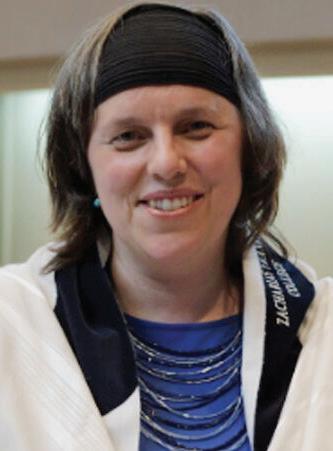
“It’s very nice to sit with new people, meet with them and learn what they do,” she said.
The atmosphere was ideal for providing meaningful conversations, Stein Kokin said. “It was not too small, not too big and a wonderful mix of newer and longtime members who don’t get the chance to know each other at larger events.”
Stein Kokin first floated the idea of
satellite Jewish communities at Valley Beit Midrash’s panel “Can the Phoenix/ Scottsdale Community be United?” on Jan. 17. She would like to see a Jewish community more open and accessible to Jews who are unaffiliated, who might not want to go to a synagogue but would go to a friend’s or a colleague’s house for Shabbat dinner or other spiritual gatherings.
“We need Judaism in our lives and we need friends in our lives. If we can bring it to people and uplift Shabbat in that way, I’ve achieved a lot,” she said. JN
For those interested in hosting a Shabbat service/ dinner, contact rabbi@bethelphoenix.com.
with what it hopes will become a new and important tradition. Every synagogue and Jewish organization in Greater Phoenix has been invited to take part. Participants include Anti-Defamation League Arizona, Bureau of Jewish Education of Greater Phoenix, Arizona Jewish Historical Society, Hillel at Arizona State University, Beth El Congregation, the Center for Jewish Philanthropy of Greater Phoenix, Congregation Kehillah, Congregation Or Tzion, Temple Beth Shalom of the West Valley, Temple Kol Ami, Temple Solel, Temple Chai, Congregation Beth Israel and ASU Genocide Awareness Week.
“We really want this to be community wide,” said Sheryl Bronkesh, president of PHA. “The response has been pretty darn good.” She hopes that the list of synagogues and organizations joining will grow each year.
For years, Bronkesh, whose parents both survived the Holocaust, saw PHA as their organization, and though she honored
Yom HaShoah with them every year, she did nothing else, she said. “But when they needed this next generation to step up, I stepped up,” and in continuing to expand the event — even keeping it alive virtually for the last three years of the COVID-19 pandemic — she honors her parents and all the survivors.
The most meaningful part of the day is seeing the survivors, holding their candles, in procession and sitting together, and each year “there are fewer and fewer. When my parents first moved here, there were more than 100 survivors; now we have our fingers crossed that we might have 25 to 30,” she said.
Eva Flaster, PHA member and chair of the event, is also a daughter of two survivors and lost much of her family in the Holocaust. This annual event is about respecting and honoring all that her parents, victims of torture, did for her.
“People need to understand what happened to make sure we don’t make the
same mistakes again, and the only way to make people understand is to tell the story,” she said.
The other change to this year’s program is the addition of two concurrent opening discussions before the main candle-lighting ceremony. Loyola Marymount University professor Margarete Myers Feinstein will tell the story of life after liberation in “Close Quarters: Victims and Perpetrators Sharing the Kitchen in Postwar Germany,” while Anthony Fusco, Arizona Jewish Historical Society’s education coordinator, will speak with several local survivors, including Stillman, in “Making an Emotional Connection to the Holocaust: Reflections of Local Survivors.”
Arizona Rep. Alma Hernandez and Christine Harthun will receive Shofar Zakhor Awards, recognizing those who educate the community about the Holocaust. Hernandez was instrumental in the 2021 passage of HB 2241, legislation mandating Holocaust and genocide edu-
cation in state schools. Harthun is an arts education coordinator at Scottsdale Arts Learning & Innovation, who has spent years connecting Holocaust survivors to classrooms across Greater Phoenix with the Hope Chest program, a curriculum and set of teaching resources designed to immerse students in local Holocaust survivor Oskar Knoblauch’s memoir.
“Working with Oskar and observing the success of Hope Chest as a tool to educate students about the Holocaust, build empathy and combat antisemitism has truly been the most rewarding endeavor, both professionally and personally. I never imagined that our work would result in recognition such as this,” Harthun told Jewish News. JN
For more information, visit phxha.com.
Jewish News is published by the Jewish Community Foundation of Greater Phoenix, a component of the Center for Jewish Philanthropy of Greater Phoenix.

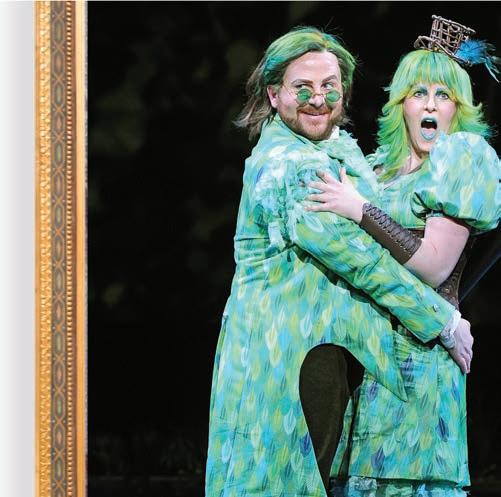
Just over five years ago, in late 2017, a handful of Jewish women in Scottsdale bonded over their conservative political views and decided they should form a club where like-minded Jewish women could come together and feel free to talk about current events.
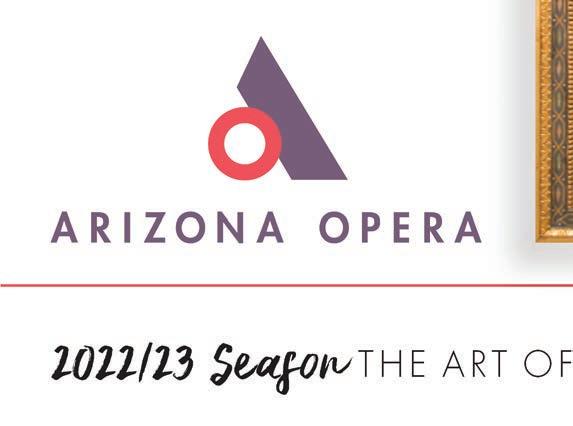
“We thought we hit on something that’s needed,” said co-founder Phyllis Kaminsky. At the first official event of the Jewish Women’s Conservative Forum (JWCF), 30 women showed up. All of them reported feeling isolated at other Jewish gatherings due to their right-wing politics and were looking for a place where they felt more at ease.
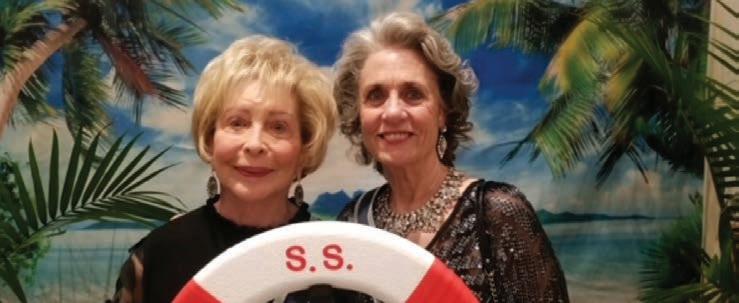
Polling from JStreet, Fox and Associated Press reported 65-74% of Jews voted for Democrats in the 2022 midterm election.
After that initial flurry of interest, the group really took off. By 2020, membership had grown from the original five to 234, and today the membership list stands at 360 and represents several different synagogues in Greater Phoenix, unaffiliated Jews and even non-Jews.
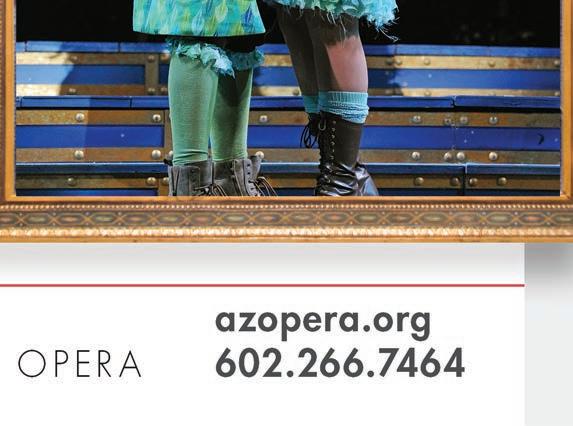
Talking politics has been their raison d’etre from the beginning and to that end,
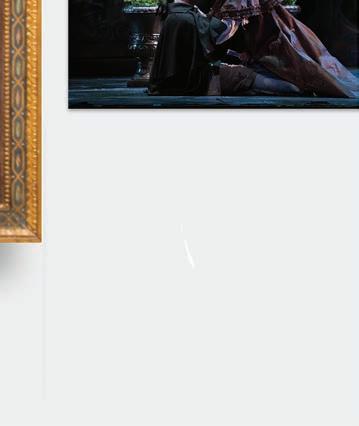
they often invite political speakers to their events. Before the COVID-19 pandemic struck, they hosted Arizona Rep. David Schweikert and representatives from the Goldwater Institute, Jewish National Fund and American Israel Political Action Committee.
The pandemic forestalled public events around the 2020 election, but in the run up to the 2022 midterms, the group hosted Republican candidates for the U.S. Senate seat, governor’s office and other competitive races. Candidates called JWCF and asked to meet with its members, Kaminsky said.
“We were sought after and delivered very well-informed audiences,” she said. “We’re on the map now.”
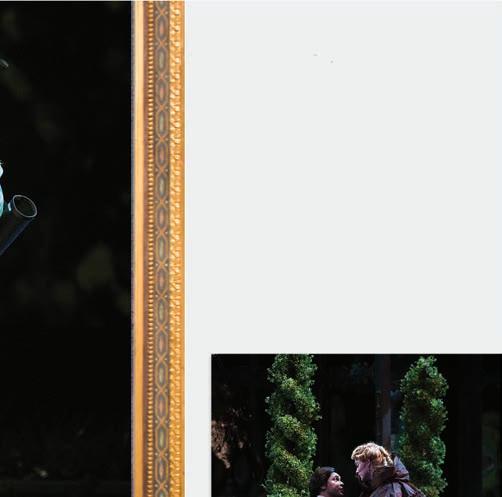
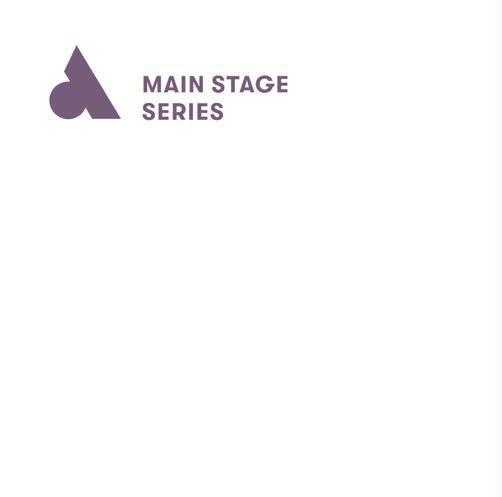
Jettie Kootman, JWCF co-founder, was happy when Tom Horne, Arizona superintendent of public instuction, called her to arrange to speak to the group. “I’ve been waiting for you to call me,” Horne told her.

“We were so happy to have him come because he was the only Jewish candidate,” Kootman said.
State Treasurer Kimberly Yee was

the final politician the group hosted at Chompie’s, where the group often hosts 50 to 60 people for brunch. One large focus for JWCF is the relationship between Israel and the United States. As treasurer, Yee invested more than $30 million in Israel Bonds and divested $143 million from Unilever, the parent company of Ben & Jerry’s, for its boycott of Israel on September 7, 2021.
“She is an amazing woman and one of the only ones that made it through,” Kaminsky said. “This is a woman who really cares about Israel and the Jewish people just love her.”
While the 2022 election is in the rearview mirror, JWCF is not slowing down. Candidates will be back in rotation in another year, but for now they continue to host political thinkers whose views they share.
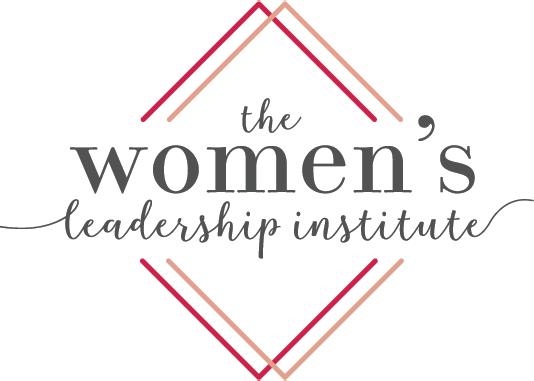
On April 16, Seth Leibsohn, a conservative author and host of “The Seth Leibsohn Show” every weekday on KKNT in Phoenix, will speak to the group. Leibsohn frequently talks around Arizona and the country, especially about the conservative political movement, the future of the Republican party and whether Arizona is really a purple state.
That last point remains to be seen, Leibsohn told Jewish News. “It’s really a tale of two cities, depending on the candidate. We’re still generally red, but the quality of the candidate matters more than anything else.”
He will tell the group that the conservative movement, like Judaism, does better when it looks forward and backward simultaneously, like Janus, the Roman god depicted with two faces.
“We should rely on all our faith, tradition and history, but sometimes conservatives focus too much on the past and not the future — including litigating the last election,” he said.
He will challenge the group to consider the state of the country and ask why, with all the access to intelligence and wealth, there are declining test scores, rising drug use and chronic homelessness.
These are the kind of issues the Jewish community has historically taken on and should be taking on now, he said.
Leibsohn’s talk will likely resonate with JWCF members, who don’t feel welcome in mainstream Jewish circles, according to Kaminsky.
“These women have a different take on policy; they think differently and with us their views are accepted and they don’t feel isolated. It’s like a haven for women who are more conservative,” she said.
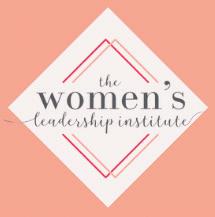
That’s the main reason Carole Ochs joined roughly a year ago.
“I stopped being comfortable talking with some of our friends. You can’t really say what you’re thinking because you know a fight is going to ensue,” she said.
She called JWCF a “godsend,” adding she felt comfortable right away.

“They’re very welcoming and the speakers have been terrific,” she said.
She also enjoys the social aspect of the dinner events where she and her husband have made close friendships.


“It’s stimulating and social and I don’t have to censor myself,” she said.
While Kaminsky doesn’t see the group having such broad appeal “that people will come banging down our doors,” every month, another five to 10 women who have heard about the group ask to join, and it’s all due to word of mouth.
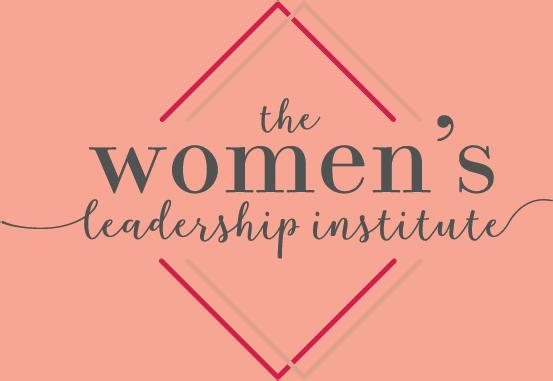
Since the group first formed, they’ve managed to govern by consensus through an executive committee made up of the
original members. More than five years on, they are considering bringing others on board.
“An organization that does not nurture a pipeline of succession will not survive,” Kaminsky said. “It’s very important to have institutional memory passed on so that the leadership can get younger and more creative.”
Still, letting go of the reins will be hard when the time comes.
“It’s like a baby — something that we created. It’s very hard to let go,” she said. JN


Sundt Construction, Inc. has F/T Concrete Project Manager/Estimator II position in Tempe, AZ. Collab w/ Prjct Team to review contrct reqmnts, prjct plans, & specs to dtrmine work scope; Intface w/ stakeholders incldng contrctrs & subcontrctrs to provide bid assistnce & estmtes, organize dsign assistnce, value engnring studies, constrctbility review, & prjct sched anlsis; Price matrl, labor & equipmt, genrl condtion & direct job expnses to complete concrete prjct estmtes & review w/ prjct team; Mnge prjct procurement sched for matrl & equipmt, coord submittals w/ trades, & ensure contrct compliance; Mnge costs to meet or exceed target margins; Prep & mnge prjct billings. MS in Civil Eng, Constrctn Eng, Constrctn Mgmt, or rltd + 1 yr exp. Drug test, Bkgrd check.Submit resume by email at recruiting@sundt.com, Incl
Job Code SCLP
“THESE WOMEN HAVE A DIFFERENT TAKE ON POLICY; THEY THINK DIFFERENTLY AND WITH US THEIR VIEWS ARE ACCEPTED AND THEY DON’T FEEL ISOLATED. IT’S LIKE A HAVEN FOR WOMEN WHO ARE MORE CONSERVATIVE.” PHYLLIS KAMINSKY
Tisha Herrera isn’t the typical candidate for Masa Israel Teaching Fellows, an immersive and long-term educational program for people ages 18-30. Her father is Ndee (Apache) and her mother’s heritage is a combination of Greek and Spanish. Six years ago, her mother discovered her Jewish ancestry through a DNA test.
“It turns out that my grandmother knew about it and kept it a secret,” Herrera said.
As a teenager, before she knew she was Jewish, Herrera had vacationed in Israel. After the DNA test, she spent several months in Tel Aviv before returning to finish her degree in communications at George Mason University in Virginia.

Before joining Masa, Herrera lived in South Korea teaching English to kids from elementary through high school. She was happy and learning Korean, yet another language for her after Mandarin and Spanish. But she felt that God wanted her to return to Israel.
“If I’m being honest, I was a bit hesitant to say yes immediately. I was establishing myself in South Korea — and life was good,” she said.
She was receiving a lot of emails from Masa at the time. Before making her decision, she went to stay with her parents in Gold Canyon in Pinal County.
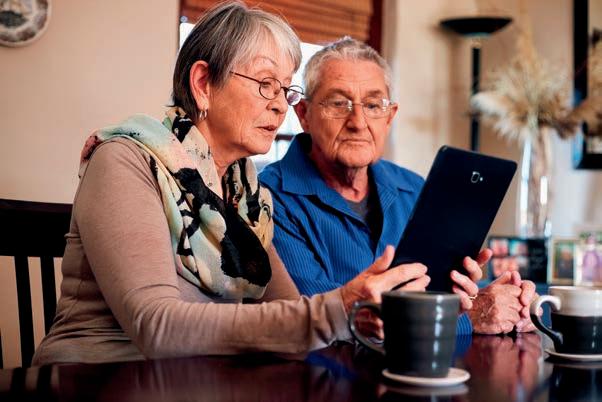
Masa prides itself on offering young people an “authentic, unmediated and challenging journey into Israeli society, culture, politics and history,” according to its website. Since being founded in 2004 by the government of Israel and The Jewish Agency, it has brought 180,000 people to Israel from more than 60 countries. It assists participants financially and logistically depending on individual need and experience.
She decided to take the plunge. It would be her third year of teaching and working with kids, “and I feel like three is a good number and if the Lord wants me
to continue teaching, then I’ll do it with Masa,” she said.

It was the best decision she could have made, she said. “I love all my kids. They’re hilarious and so intelligent — I’m just honestly so blessed that I have them.”
Teaching English is a way to remove social and cultural barriers, she said. That’s what she does for elementary students at Roi Klein School in Netanya, Israel. It is a religious school for observant Jewish students, and although Herrera must wear
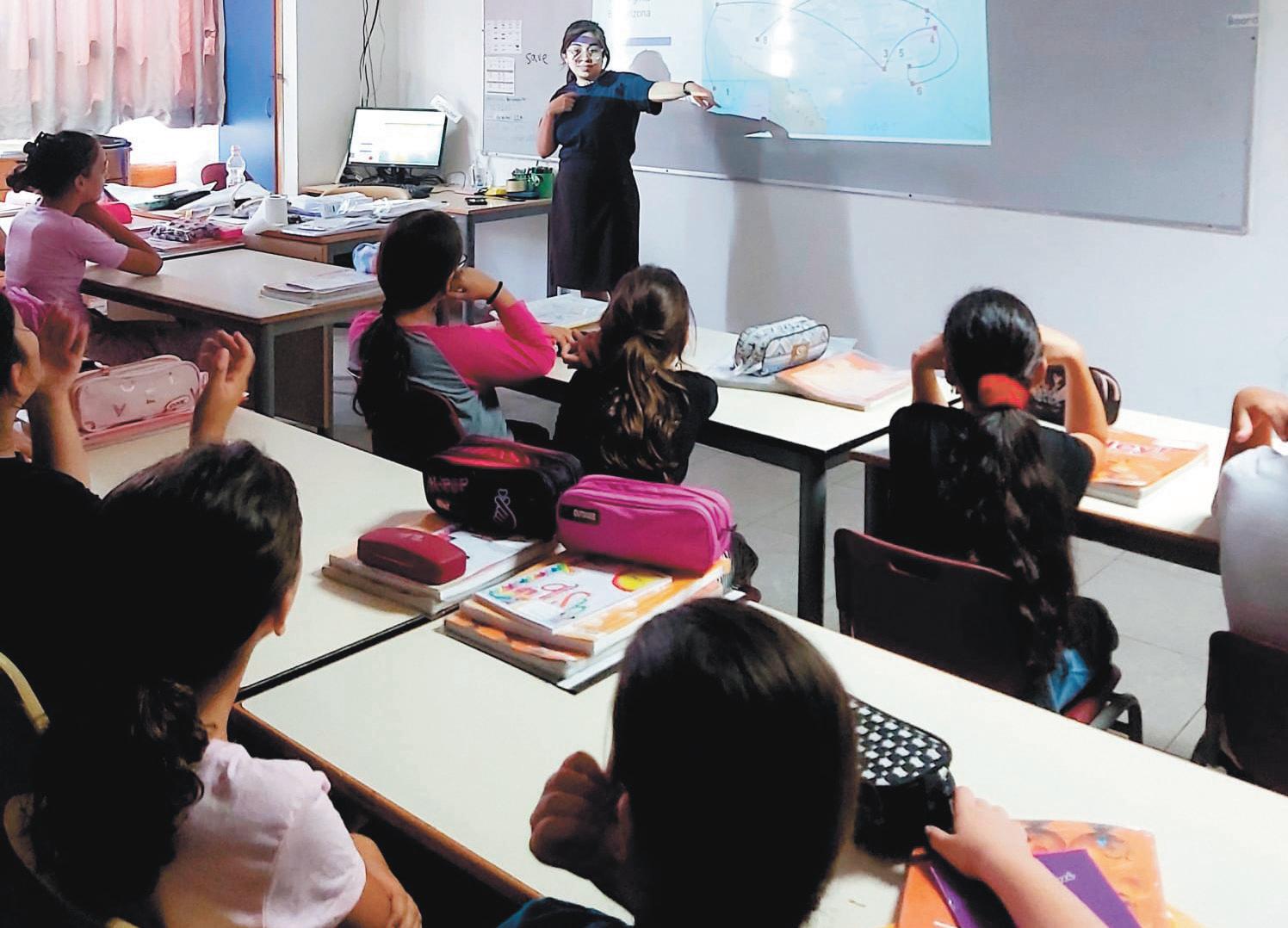

tops with modest sleeves, skirts or dresses, she is very happy there.
“My students are so loving, and so many of them run up to me and jump into my arms. They make me laugh on a daily basis,” she said.
The majority of her students speak at least some English already. They’re fascinated by her facility in Korean and Mandarin. She’s still learning Hebrew and the kids like to test her vocabulary.
“They love to hear me count and say,
‘Good morning’ and just literally anything! It makes me so happy,” she said. She calls her host teacher at the school her “lighthouse” and considers their relationship almost like mother and daughter. The sad thought of leaving her and the children has caused Herrera to consider extending her contract another six months when it’s up on July 2.
The principal is kind but shy and though he doesn’t speak English well, she has been practicing with him. Usually, there would
be another Masa fellow like her at the school but she’s the only one now. Still, she said it’s better this way. She can work one-on-one with the students and get to know them.
With no more than 10 students in a class, “we can vibe together. There’s no pressure and we can make jokes. And these kids, they just crack me up,” she said.
Masa pays for her food and board in the program; she lives in a house with three roommates but has her own room.

“I’m 28 and I haven’t had a roommate for a very long time. So the adjustment period was … interesting. But I think we’ve worked it out,” she said.
Herrera, who said she’s “just as Jewish as everyone here and feels like a complete Jew,” recognized that the way she experiences faith is a bit unique.
“The relationship that I have with the Lord sometimes can offend people,” she said. She’s very curious about other religions and reads the New Testament. She also reads the Hebrew Bible daily, which brings her a sense of peace and makes her feel whole, she said.
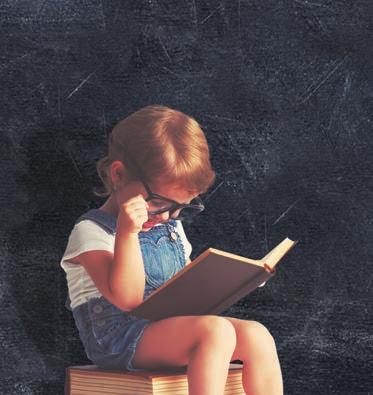
“I don’t think anything should be off limits necessarily, because it’s your relationship with God, however you decide to define that,” she said.
Still, she tried to fly under the radar to avoid making waves. She kept her
religious beliefs and curiosity to herself until someone found a gift with a cross on it that her parents gave her. Because she also identifies with Christianity and “loves Jesus as a Jew” she has faced accusations from someone who suspected her of anti-Jewish feelings. That couldn’t be further from the truth, she explained.
“I’m a Zionist. I love Israel with all of my heart and I love the Lord with all of my heart,” she said.



While her views are unconventional, her colleagues at the school have not raised any reservations.

“They know that I’m Jewish and that’s all that matters, because that should be all that matters, right? It’s something that I pray about every day. I love the Lord but I don’t know what’s going to happen, and I don’t know exactly why he wanted me to come here. I think he wanted me to meet certain people, be at the school, interact with the people in my community and be kind to them. If he wants me to make aliyah, I will.
“People in foreign countries have been surprised that there are Americans like me and I tell them we’re not all the same. There is no look to Americans — just like there’s no look to Jewish people. We’re all unique and different,” she said. JN
For more information, visit masaisrael.org.


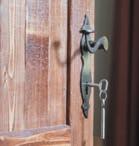
FOR BUYERS AND SELLERS since 2003
DEBBIE FRAZELL E 602.399.8540
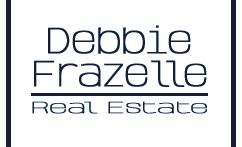


Debbie@DebbieFrazelle.com

DebbieFrazelle.com
Phoenix Holocaust Association Invites the Community to Holocaust Remembrance Yom HaShoah Commemoration






Nissan 25, 5783
Sunday, April 16 at 3 pm Congregation Beth Israel 10460 N 56th St, Scottsdale, AZ 85253



Registration: phxha.com

We will honor the memory of those who perished during the Holocaust and recognize those who survived. Visitors will select one of two concurrent sessions which will be followed by a commemoration program including a procession of survivors, candle lighting in memory of the 6 million, presenting the Shofar Zakhor Awards to recognize those who educate the community about the Holocaust, and musical pieces organized by CBI Cantor Seth Ettinger.
Concurrent sessions preceding program:
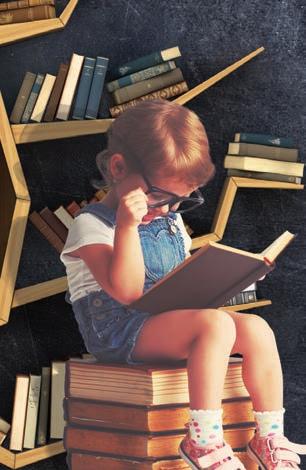
Making an Emotional Connection to the Holocaust: Reflections of local survivors or


Close Quarters: Victims and Perpetrators Sharing the Kitchen in Postwar Germany Margarete Myers Feinstein, PhD, Loyola Marymount University
Community Partners: Rosenbluth Family Charitable Foundation Genocide Awareness Week @ ASU

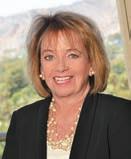
MONDAY, APRIL 17 | 6 PM OPENING RECEPTION WITH LIGHT REFRESHMENTS: 5:30 P.M.
A lecture-recital featuring music by Viktor Ullmann, Leo Smit and László Weiner, three composers who were killed in the Holocaust.
Presented by Hannah Creviston (piano), Nancy Buck (viola) and Sabrina Hu (flute)
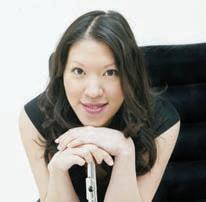
Through the presentation and performance of these works, we strive to keep alive the stories, art and legacy of those killed in the Holocaust.
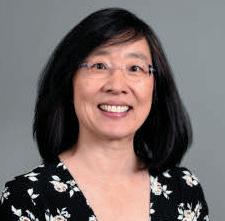
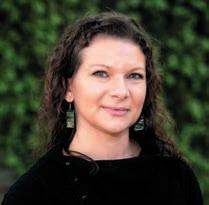
Holocaust survivor and author Dirk Van Leenen will share his story of survival in Holland and sign copies of his books, which will be available for sale. The program also includes a candlelighting ceremony with representatives from the City of Chandler and local faith leaders.
The program is free, reservations are required at evjcc.org/yomhashoah


Amatchmaker who says she has successfully paired 200 Jewish couples is the star of “Jewish Matchmaking,” a Netflix series that is set to start streaming May 3.
Netflix announced the series, a spinoff of its wildly successful “Indian Matchmaking” show, nearly a year ago. Now, new details that the streaming giant released on March 30 reveal that it will take place in both the United States and Israel, and will feature people from a variety of Jewish backgrounds.
Their guide will be Aleeza Ben Shalom, an Orthodox Jewish dating coach with a decade of experience who was based in the Philadelphia area and moved to Israel two years ago.
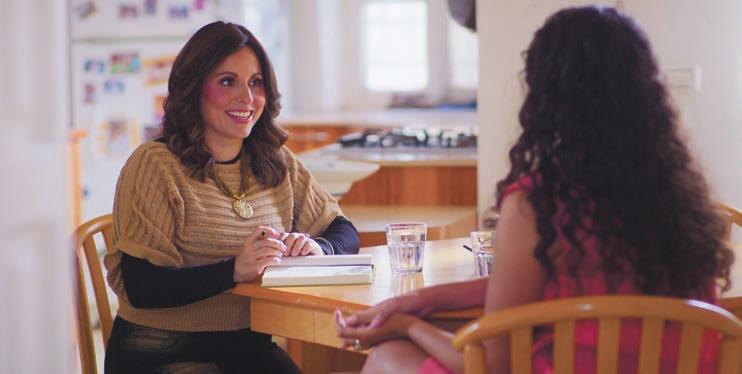
“Jewish Matchmaking” follows Aleeza Ben Shalom, a top Jewish matchmaker, as she helps her clients meet their bashert, or soulmate. (Netflix)
“Finding your person is the hardest thing to do in the entire world,” Ben Shalom says in the show’s trailer, which dropped Thursday. “And that’s where I come in.”
Netflix is keeping most details about the show secret until closer to the launch date, but the trailer shows one man who is part of the process — “I don’t want to have to explain to her why ‘Curb Your Enthusiasm’ is funny,” he explains, after being asked why he is looking for a matchmaker — and several women. Multiple cast members posted about their involvement on social media on Thursday, including comedian and disability activist Pamela Rae Schuller and Miami-based marketing executive Dani Bergman.
Formal matchmaking is common in the haredi Orthodox world, where many couples pair off through a formal and speedy process that has been depicted in shows such as “Shtisel,” which also streams on Netflix. Other Jews date and
marry on their own, and a slew of dating services and apps have catered to matching Jews with each other.
“In today’s world of modern love, we are used to turning to technology to find love,” Ben Shalom told E! News. “We download apps and we upload profiles. We swipe left or swipe right. And yet, somehow finding ‘the one’ has never been harder.”
“Jewish Matchmaking” will run for eight 30-minute episodes, featuring a diverse set of couplings, from Orthodox singles who observe the rules of negiah — the prohibition on touching before marriage — to Reform and secular U.S. Jews who, data show, are statistically likely to marry people who are not Jewish.
The show — whose title is translated into Hebrew as “Modern Matchmaking” — is modeled on “Indian Matchmaking,” now entering its third season, which also focuses on a professional matchmaker and people looking for love. While the show has been popular with audiences, it has also drawn criticism for reinforcing religious and caste segregation; no couples from its first season remain together.
Ben Shalom, who says she grew up secular and later became more traditionally observant, works exclusively with Jewish singles. This week, she launched a podcast called “The Yentas” with two other Jewish matchmakers affiliated with Tribe12, a Philadelphia organization serving Jewish young adults that includes a matchmaking service.
“We know it can carry a negative gossipy connotation,” they say in the first episode about the name of their show.
“Maybe you saw ‘Fiddler on the Roof’ where the word is associated with being a busybody, somebody who wants to make matches but doesn’t have your best interest at heart. We are not that. We are love professionals.” JN
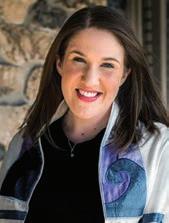
n early morning walk in late February in Jerusalem as the bus zooms by on the modern street next to a historic windmill and an Israeli father at the intersection motions to his young daughter rega , wait a moment. Dozens of young orthodox students fill the interior of the bus station with a makeshift mechitzah, separating men and women, davening through the service while surrounded by tourist shops and restaurants getting ready for the day. A cab driver yells out the window at the driver in the car next to him a not-sobeautiful barrage in our beautiful sacred tongue, Hebrew. The Old City and Temple Mount are in the distance as the sun rises beyond it. Israel in all its glory. Israel at an inflection point.
The following Motzei Shabbat (Saturday evening), I joined Reform rabbinic colleagues from North America, Israel and several other countries to march with the 160,000 gathered in downtown Tel Aviv demonstrating for democracy and protesting against the proposed judicial overhaul in Israel. We were in Israel for a week of study, conversation and exploration for the annual convention of the Reform Movement’s Central Conference of American Rabbis. In that eighth week of protests, 300,000 marched throughout the country; as of this writing, the protests have not only continued but more than doubled in size. The change to the judiciary that the majority coalition promotes is complex, but its core proposal would give a simple majority of the Knesset the power to overturn rulings of Israel’s Supreme Court, restricting their ability to strike down laws it deems unethical or illegal. Undercut the Supreme Court and it is clear that issues around Jewish identity and Jewish diversity, gender, the question of who is a Jew and the right of return, the rights of minorities and the LGBTQIA+ community and so much more are at risk.
I marched — with my protest sign calling for a Jewish and democratic Israel — surrounded by Israeli flags waving and the crowd singing. There were signs quoting Torah: “Tzedek, tzedek tirdof,” (Justice, justice, you shall pursue). Signs
Asaid, “No judiciary, no democracy.”
What energy and enthusiasm there was, with many people uniting for one cause! There was also palpable upset and concern, as chants of “Democratia, democratia!” (Democracy, democracy!) were interspersed with “Busha! Busha!” (Shame! Shame!). I kvelled as Rabbi Rick Jacobs, the president of the Union for Reform Judaism, was invited to address the crowd. He was the first non-Israeli to speak and his expression of the worldwide Reform movement’s support for Israel’s democracy drew cheering and applause from the crowd.
button, and now it might be too late. I hope it’s not.”
The Israelis I spoke with that evening, and throughout my trip, shared that they have been sad and fearful, imagining that the Jewish community outside of Israel will be so turned off by what is happening that we will throw up our hands and say, “That’s not my Judaism, this can’t be my country, this isn’t my home away from home.” The group we spent Shabbat with said it gave them hope that we were there and that my colleagues and I shared how we care and that our communities care. They said “Thank you for being here.
Israel; they want our friendship and our connection. One Israeli said these words, “Thank you for not abandoning us. We need you.”

That is the important message of this moment: Each of us needs to determine what caring for, supporting and staying connected to Israel and Israelis means now. Whatever your politics, whatever Israel organization you are involved with, this moment calls upon us to raise our voices and to make sure that in word, in deed and dollars, these organizations are wielding their power to support Israel not only as it is, but as we know it someday could be: deeply rooted in Jewish values, democracy, equality and with healthy space for progressive Judaism at the table.
The vote on the proposed judicial overhaul has just been postponed, at least for a time. The protests and the international outcry have had an effect. Still, we cannot say what the future will bring. And I want to share with you that I walked away from my time in Israel unsettled, yes, but also filled with hope and love for Israel that had only deepened and expanded.
One of my last mornings in Israel, I joined a group for a wonderful walking tour of a neighborhood in Tel Aviv, Neve Tzedek, which was populated with writers and philosophers soon after the city was founded. Our tour guide referenced how these early days were a period where Israel was a m’dinah sh’baderech (a country in development). And I was struck by how true this still is today; Israel is always a m’dinah sh’baderech. It is always growing, changing and learning, encountering and meeting new challenges.
Just the evening before, I joined a small group to bring in Shabbat with a fledgling progressive Jewish community. We enjoyed Kabbalat Shabbat services and a vegan potluck dinner in a greenhouse in the middle of a sustainable garden in Hod Hasharon, close to Tel Aviv. Over tea and dessert, we sat and talked. The Israelis shared their feelings and concerns about the moment. They were worried. So deeply worried in fact, they feared that Israel’s very democracy could crumble if the judiciary were disempowered. They expressed concern that the Israeli public, in their words, “has woken up, but they have woken up too late, to a nightmare.” While wrangling his adorable three-yearold child, one young Israeli father told us “We pressed and pressed the snooze
Thank you for caring. Please keep coming and please keep caring.”
Over the years, as American Jews, we have received the message from our siblings in the State of Israel that the way we should support our homeland is only with tourism, with blanket support of all policies and governmental actions and with our financial resources. Beyond that, we should leave Israeli policies, politics and challenges to the Israelis. The message I received on this trip was the exact opposite, across the board. We American Jews are not irrelevant, our voices and opinions and advocacy for democracy matter to Israelis and matter to Israel. They need our involvement; they want us to care about what is happening there and to push for a more just and democratic
We American Jews are part of the continued development in Israel, our m’dinah sh’baderech. You may not agree with me about what is right for Israel or the best way to support Israel. That’s okay; disagreeing among siblings is one of our longest-standing Jewish traditions. Nonetheless, together, let us continue to show up for Israel in our words and deeds, with our support through organizations aligned with our values and by physically showing up. May we never abandon Israel; may we never abandon the belief that Israel can represent the best in us. I won’t stop showing up for Israel. I hope you will show up for Israel with me.
We are a diverse community. The views expressed in these opinion pieces do not necessarily reflect the views of the officers and boards of the Jewish Community Foundation, Center for Jewish Philanthropy, Jewish Federation of Greater Phoenix, Cleveland Jewish Publication Company or the staff of the Jewish News. Letters must respond to content published by the Jewish News and should be a maximum of 200 words. They may be edited for space and clarity. Unsigned letters will not be published. Letters and op-ed submissions should be sent to editor@jewishaz.comIsraelis protest outside the Supreme Court in Jerusalem, against the government's planned judicial overhaul, March 27, 2023. JAMAL AWAD/FLASH90
epending on which day of the week Passover falls, the Torah readings for the intermediate days are slightly different and would take the whole page to outline. If you Google, “Yom Tov Torah readings,” you will see a full list of the variations.
In general, the readings during the week (or eight days in the Diaspora for many congregations) take us back to the Exodus journey of the Israelites from the time of the plagues in Egypt to the first Passover seder on the eve of their departure before they left Egypt. The journey continues as they approach the Sea of Reeds, make their way through on dry land, come to the wilderness, receive the Ten Utterances and the second set of tablets, after the sin regarding the Golden Calf, and then the reminder of the compassionate address
D— the Thirteen Attributes of Mercy — with which to approach the Holy One. The intermediate days, Chol Hamoed , also reminds the congregation of the importance of observing the pilgrimage festivals; not eating any leavened products during Passover; and tells the highlights of the Exodus and how it is to be celebrated in later generations when the Temple stood in Jerusalem. The importance of telling our children the story from generation to generation is stressed.
The Eighth Day reading, for those who observe eight days, offers a review of the importance of Shabbat and the yearly cycle of festivals, with the offerings brought to the Temple in Jerusalem on the three annual pilgrimage festivals: Passover, Shavuot and Sukkot. The Eighth Day’s connection with future redemption appears in the Haftarah from Isaiah 10:32 – 12:6, containing one of my favorite verses: “And there shall come forth a shoot out of the stock of Jesse, and a twig shall grow forth out of his roots, and the spirit of the Lord shall rest upon him, the spirit of wisdom and
BERRY SWEET
As Pesach 2023 fast approached, alumnae of the Women’s Leadership Institute’s Mentoring Program, now in its 8th year, were offered an intriguing opportunity: Join together and spend an afternoon delving more deeply into the role of women in the Exodus story and exploring the relevance of our ancestors’ journeys to our own. Women’s Leadership Institute (WLI) alumnae gatherings have always provided us with new information and insights, as well as priceless opportunities to interact with each other, and this day was no exception.
The day began with a teaching from Rabbi Elana Kanter, inspirational founder of the WLI. Most of us had never read about Serach Bat Asher, a granddaughter of the patriarch Jacob, who journeyed with him to Egypt during the great famine. Folklore has it that she lived 400 years and ultimately played a pivotal role in the Passover drama; her acknowledgment of Moses as leader was the lynchpin in the Hebrews’ decision to follow him out of Egypt, despite profound misgivings and fear. As the legend goes, Serach’s father, Asher, had entrusted her with “The Mystery of the Redemption,” a password of sorts, which would be uttered only by the one destined to lead the Hebrew slaves from slavery to freedom. Her dec-
laration that Moses was that leader, and her disclosure to him of the location of Joseph’s remains (to be taken and buried in Eretz Israel), reinforces once again the sometimes obscure, yet important, role of women in the survival of the Jewish people.
Our discussion moved then from the comparative obscurity of Serach to the high visibility of the prophetess Miriam. For many of us, adding a water-filled wineglass to the seder table has long symbolized the integral role that Miriam played in the redemption of our people. Retelling Miriam’s story — from the banks of the Nile thick with reeds, to the tumultuous Red Sea, to the miracle of water in the desert — has always reminded us of her pivotal role in our history. This day, we dug a bit deeper, discussing “Miriam’s Goblet,” a Passover reading originally published in Lilith Magazine. This short essay guided us to a fuller understanding of Miriam’s significance as the embodiment of hope and renewal from her time forward. An excerpt:
“We place Miriam’s Goblet on the seder table to remind us (also) of Jewish women, whose stories have been too sparingly told. On Passover in particular, a holiday celebrating many kinds of birth (that of Hebrew babies in Goshen, of Moses, of the Jewish People, of springtime), we recall
understanding, the spirit of counsel and might, the spirit of knowledge and of awe of the Holy One” (Isaiah 11:1-2).
One highlight of this Passover week, including the intermediate days, is the beginning of counting the Omer, seven weeks of spiritual refinement leading up to the 50th day which will be Shavuot, the pilgrimage festival, which is not only an agricultural festival of bringing the first fruits as an offering, but also celebrates the giving of the Torah at Mt. Sinai. The count begins on the evening of the second night of Passover and extends the awareness of this very special time from merely a week during Passover to the six weeks after. A time of transition from the barley harvest — considered akin to our animal-like aspects — to the wheat harvest, considered a finer grain, representing our higher spiritual souls.
Each evening those who are counting the Omer check in, not only doing the count of a number according to the mitzvah, but also following a Kabbalistic journey from Hesed in the week of Hesed on the first day, and cycling through all the seven lower
sepherot; so the second day is Gevurah of Hesed, the third is Tiferet of Hesed, and so on, until we reach the day of Malchut in the week of Malchut on the 49th day.
That spiritual preparation of the seven weeks readies us to receive Torah on the 50th day, Shavuot, which means “weeks.” Contact me for a calendar outlining the Kabbalistic sepherot for each day (rabbimagal@jcsvv.org) or look online for reminders you can receive each day with prompts for an appropriate meditation and focus.
May we each enter the week of Passover with a sense of embarking on a journey, echoing the Exodus in ancient time and preparing us for our own path toward increased learning and spiritual elevation. JN
women, whose domain, of course, is birth. Beyond the many males in the Haggadah — Jacob, Laban, Pharaoh, Rabbi Tarfon, Rabbi Eliezer, Sisera, Elijah, even G-d as “King” — Miriam’s cup remembers others.”
Traditionally, we incorporate a craft project into our gatherings; this day, we were to design a new kind of Seder plate. Instead of using items that signified aspects of the Hebrews’ life in, and exodus from, Egypt, we each were asked to create a plate that represents our own journey and choose symbols (images, phrases or words cut from magazines) that would convey our own stories. The sharing of these narratives inevitably deepened our connection to one another.
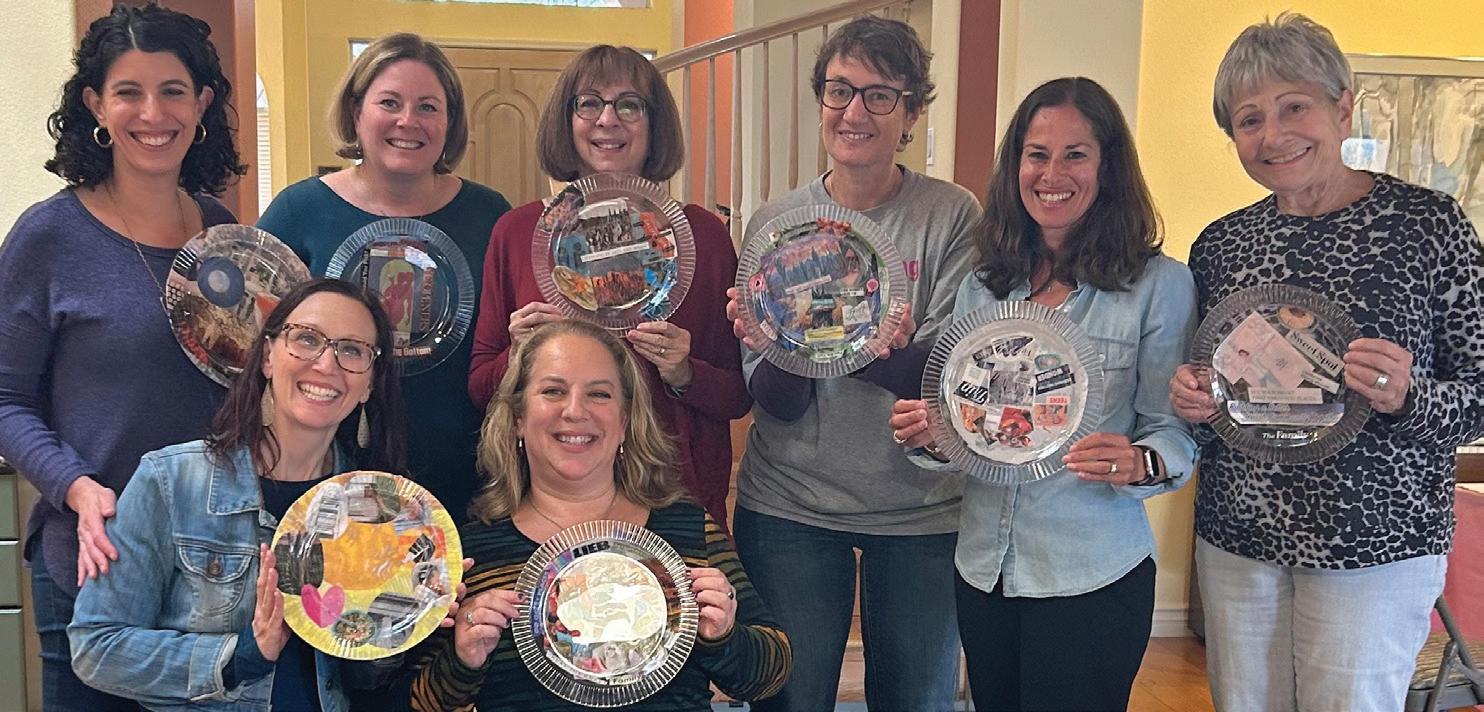
Finally, in acknowledging that any discussion about the seder table must surely involve wine, we closed our day together with a brief wine-tasting experience. And what did we take away from this pleasant
diversion? That these days, one does not have to limit “wine for Passover” to the sweet, sweet red wines remembered from seders of yore; a wide selection of kosher for Passover wines from all over the world is now available. What an intoxicating conclusion (not really) to a day of deepening friendships, learning and discovery — with the bonus of providing us all with new material and information to enrich and enhance Passover 2023. JN
Berry Sweet was a founding mentor of the Women’s Leadership Institute and has been an active WLI volunteer for the past eight years. She has held numerous leadership positions in both the Jewish Federation of Greater Phoenix and Jewish Community Foundation of Greater Phoenix, and was a recipient of Federation’s Medal of Honor for a lifetime of service.
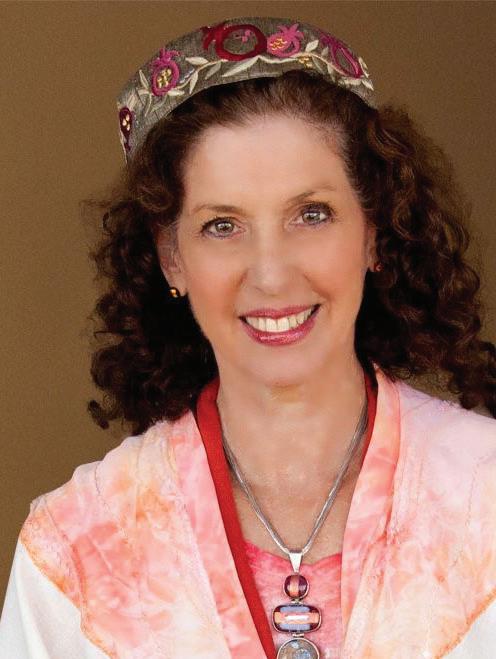
If you haven’t already met him, I would like to introduce you to my favorite television character, Ted Lasso. The Ted Lasso show is a comedy-drama series whose plot is centered around the unlikely story of a Division II Midwest college American football coach who is hired to coach a fictional English Premier League football (soccer) team, AFC Richmond. What starts out as an act of vengeance due to an ugly divorce to sabotage the team, becomes the plot twist that is described as the “Ted Lasso effect.” Lasso’s superpower is “kindness.” His focus on empathy, empowerment and human connection speaks to me on such a personal level as we strive to provide the best care for our aging seniors.
Lasso’s quirky, comical quotes inspire me to think and draw parallels to senior care. Here are a few:
• “Taking on a challenge is a lot like riding a horse, isn’t it? If you’re comfortable while you’re doing it, you’re probably doing it wrong.”
• “You know what you do with tough cookies, you dip them in milk.”
• “There is something worse than being sad, it’s being alone and sad.”
Every time, I hear one of these masterful quotes, I am drawing analogies to helping families in the senior care space. Even though this guy is a fictional character, he sort of feels like a friend, a cheerleader or a life coach.
Lasso might not know anything about soccer, but he really does know how to help people become better versions of themselves. The success of “Ted Lasso” is driven by its unique ability to make audiences feel warm while the characters grapple with real, uncomfortable issues. One issue is the show’s focus on mental health. Last month the cast of Ted
Lasso made a special visit to the White House and met with President Joe Biden and First Lady Jill Biden to highlight the importance of addressing mental health needs. Their message of hope and kindness included urging people to check in often with friends, family and coworkers to ask how they’re doing and to listen, sincerely.
Industry and organization leaders and managers in every workplace could learn from the compassion of our fictional hero, Ted Lasso. The reality of checking in with our friends and coworkers would, in many cases, reveal an increase in family caregiving and the emotional, physical and financial strain placed on these family caregivers. In the real world, an organization with many younger people with the demographics of Lasso’s team, AFC Richmond, could be caring for an aging adult.
Since the pandemic, as caregivers available for hire have become rarer and extraordinarily expensive, the estimated number of unpaid family members who have stepped in has nearly doubled. According to a 2021 report from the Centers for Disease Control and Prevention, 34.1% of Americans ages 18 and older are either caring for an adult or juggling the care of both adults and children. In another poll 60% of first-time caregivers were Millennials or Generation Z. Of all the challenges that a family caregiver faces, the emotional toll has been consistently documented as the most pervasive and severe.
I have a suggestion to Apple TV+ and the writers of the “Ted Lasso” show. Can America’s most lovable coach delve into the challenge of being a family caregiver? One day, every writer, actor and athlete will be one or need one. Let’s see the “Ted Lasso” show shine a light on becoming a family caregiver. Lasso would inspire family caregivers to “believe” that they can do this and know that they are not alone in this journey. JN
Bob Roth is the managing partner of Cypress HomeCare Solutions.
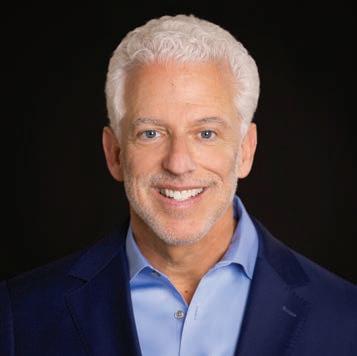
Hearing care should be part of your overall health regimen, just like going to the dentist or eye doctor. HearingLife can help you begin your journey to better hearing. HearingLife is a national hearing care company that operates nearly 700 hearing care centers in the U.S. Our revolutionary new hearing devices give the brain more of the relevant information it needs. You may have improved speech understanding and the ability to remember more. Enjoy the
Hearing care should be part of your overall health regimen, just like going to the dentist or eye doctor. HearingLife can help you begin your journey to better hearing. HearingLife is a national hearing care company that operates nearly 700 hearing care centers in the U.S. Our revolutionary new hearing devices give the brain more of the relevant information it needs. You may have improved speech understanding and the ability to remember more. Enjoy the convenience of rechargeability and Bluetooth® connectivity.
Hearing care should be part of your overall health regimen, just like going to the dentist or eye doctor. HearingLife can help you begin your journey to better hearing. HearingLife is a national hearing care company that operates nearly 700 hearing care centers in the U.S. Our revolutionary new hearing devices give the brain more of the relevant information it needs. You may have improved speech understanding and the ability to remember more. Enjoy the convenience of rechargeability and Bluetooth® connectivity.
●
Hearing care should be part of your overall health regimen, just like going to the dentist or eye
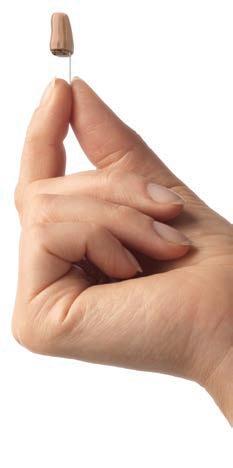
HearingLife can help you begin your journey hearing. HearingLife is a national hearing care that operates nearly 700 hearing care centers U.S. Our revolutionary new hearing devices brain more of the relevant information it
may have improved speech understanding and ability

remember more. Enjoy
Hearing care should be part of your overall regimen, just like going to the dentist or eye HearingLife can help you begin your journey hearing. HearingLife is a national hearing care that operates nearly 700 hearing care centers U.S. Our revolutionary new hearing devices brain more of the relevant information it needs. may have improved speech understanding and ability to remember more. Enjoy the convenience rechargeability and Bluetooth® connectivity.
"YOU KNOW WHAT YOU DO WITH TOUGH COOKIES, YOU DIP THEM IN MILK.”
TED LASSO
Seymour Stein, one of the most influential music executives of the 20th century, who frequently throughout his career referred to his Jewish Brooklynite roots, died at 80 on Sunday at his home in Los Angeles.
The cause was an unspecified form of cancer, according to reports.


Stein, born Seymour Steinbigle in 1942 and raised near Bensonhurst, Brooklyn, signed artists to his Sire record label ranging from pop superstars like Madonna to punk rockers like The Ramones to New Wave pioneers like the Talking Heads. He also helped found the Rock & Roll Hall of Fame in the early 1980s and was inducted with a lifetime achievement award in 2005.
As he details in his 2018 autobiography, Stein’s father became closer to Orthodox Judaism in his 30s and 40s, regularly bringing his family to a nearby synagogue, where he was a vice president. Stein wrote that his father stopped by the synagogue at 6 a.m. before working in Manhattan’s Garment District and then again after work on his way home every day.
He described the Jews of 1940s Brooklyn in detail in “Siren Song: My Life in Music”:
We had every flavor of Ashkenazim — Russian, Polish, Baltic, Romanian, Austrian, Hungarian, German, and Czech Jews, including about fifty thousand survivors from the concentration camps. We had lost tribes you didn’t even know existed — Syrian, Iraqi, Persian, Yemeni, Ethiopian, even some Sephardic Jews whose family trees had curled through Spain, North Africa, the Middle East, and South America…. [E]ach Jewish community was distinct, often with its own native food and language.
In 1966, Stein — who shortened his last name on advice from an early mentor, the Jewish executive Syd Nathan — cofounded Sire Records, which would go on to sign and promote artists from a range of burgeoning genres in the 1970s, ’80s and ’90s: British indie rockers like The Smiths and The Cure, electronic innovator Aphex Twin, the rapper Ice-T.
“He knows all the lyrics to every song you’ve ever heard,” said Chrissie Hynde, the famed leader of The Pretenders, another Sire band.
Along the way, Stein wrote and mentioned in interviews how he found cama-

raderie with other Jewish executives and stars, after having grown up in an era when Jews were implicitly banned from some professions in the United States but found a haven in the entertainment industry. In his autobiography, for instance, he calls Lou Reed and New Wave electro-rocker Alan Vega fellow Brooklyn Jews.

“It’s amazing now that so many doctors and lawyers are Jewish,” he said in a 2013 interview with Tablet magazine. “Jews in America weren’t allowed in those professions 120 years ago. Music is something Jews were good at and they could do. All immigrants into America tried their hand at show-business.”
Stein signed Madonna from his hospital bed, where he was recovering from an openheart surgery in 1982. She would release three top-of-the-charts albums with Sire before creating her own imprint in 1992.
In 1975, his wife, Linda, encouraged him to look into The Ramones, a group of scrappy punks in ripped jeans from Queens (two of whom were Jewish). She would co-manage the band for a time before becoming a real estate agent.
Stein, who later came out as gay, wrote
that “the roles were a little confused” in his marriage and that he felt pressured to hide his attraction to men in part because of his traditional Jewish upbringing. “Just because I may have been gay didn’t mean I wasn’t Jewish,” he wrote. He and Linda had two children but eventually divorced.
In the Tablet interview, Stein mentioned that he stayed observant, though not Orthodox, throughout his life. He visited Israel several times and worked with Israeli pop star Ofra Haza on multiple albums. In the 1990s, he visited the grave of Rabbi Nachman of Breslov in Uman, Ukraine, a small town where thousands of Orthodox Jews gather each year on Rosh Hashanah.
“I feel a strong attachment to Nachman’s teachings,” he said.
Linda Stein was murdered by her assistant in 2007, and their daughter Samantha died in 2013 from brain cancer. Stein is survived by their other daughter Mandy, a sister and three grandchildren. JN
Live vibrantly amid the breathtaking backdrop of Camelback Mountain, with access to:

• Five-star hotel-like hospitality
• A rich culinary experience – from casual fare to gourmet dining

• Exceptional amenities, including multiple fitness areas and a high-end salon
• Enriching social, cultural, and recreational programs
• Spacious one- and two-bedroom floor plans, with stunning views and balconies
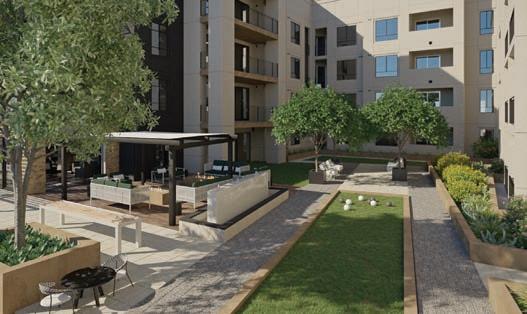
• First-class assisted living and memory care neighborhoods met with 24-hour support


This dream retirement lifestyle is no mirage. To learn more, please visit ClarendaleArcadia.com or call 480-637-2768.

 SUSAN ANABLE | SPECIAL TO THE JEWISH NEWS
SUSAN ANABLE | SPECIAL TO THE JEWISH NEWS



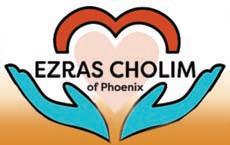







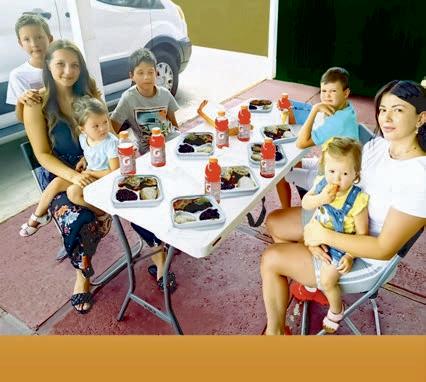
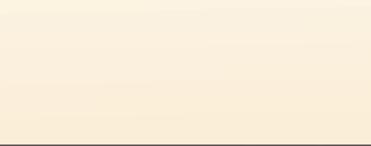




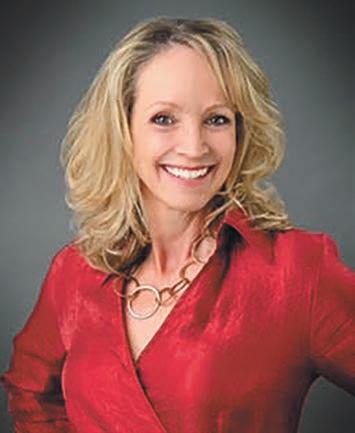
online regularly. But with an increase in online activity comes an increased risk of compromising your personal information. To an identity thief, personal data can provide instant access to financial accounts, credit records and other assets. A recent study revealed Baby Boomers and those in the Silent Generation (born in 1928-1945) worry just as much, if not more, about online security and privacy than those in Generation Z or Millennials.
When the pandemic arrived, many seniors went from in-person classes and events to participating on Zoom. Their computer use changed from occasionally checking Facebook and emails, to surfing the web and being
A survey conducted by the Internet Innovation Alliance, a nonprofit organization that aims to ensure every American has access to broadband internet, found that 77% of seniors expressed concern over the hacking of their personal financial information from online and social media companies, compared to 67% of Millennials. And 79% of Baby Boomers expressed concern with how technology and social media companies use their data and location information, compared to 74% of Millennials.
Online safety is a concern for any age group, but if you belong to the Baby Boomer or Silent Generation or are a loved one or caretaker of someone from these generations, making sure that you engage in safe practices online can help to protect valuable, private information.
According to a 2019 report from the Pew Research Center, roughly 28% of Americans said they had suffered at least one of three kinds of major identity theft problems in the previous 12 months: 21% had someone put fraudulent charges on their credit or debit card; 8% had someone take over their social media or email accounts without their permission; and 6% had someone try to open a credit line or get a loan using their name.

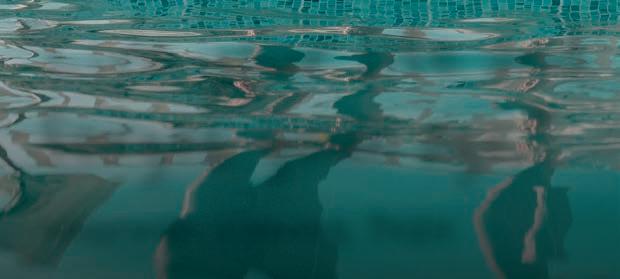















One nefarious tactic that online hackers use to access your information is to send emails or text messages pretending to be someone else. This practice is called “phishing.” These messages may look like they are from a friend or family member or someone unknown claiming you have won a contest. They will typically convey a sense of urgency to get their victims to act quick and respond with personal information like their social security number (SSN) or bank account numbers.

In 2021, the FBI’s Internet Crime Complaint Center reported that more than 92,000 victims over the age of 60 lost over $1.7 billion. This represents a 74% increase over 2020 reported losses. If you know to be cautious of these types of messages, you can help prevent others from falling for phishing schemes and losing information, privacy or money.


A crucial first step to protecting valuable information online is to ensure that your password is strong enough. Sometimes it’s hard to come up with a strong one, let alone remember it. Writing a password down on a sticky note is not safe and can be frustrating when you need it immediately. In addition to using a different password for every website and service, AARP recommends using password manager apps. These apps assist users in creating strong passwords, storing passwords and recalling passwords. There are a variety
of popular password managers available — Keeper, Sticky Password, Last Pass, Dashlane, RoboForm, 1 Password, True Key and ZOHO Vault — that are easy to use and free to start.








Two-factor authentication is an excellent security tool and widely available through most sites and apps that require a password. With two-factor authentication, the user is sent a one-time code to their phone, email or another networked device that they must enter into the site or app they are connecting with to proceed.







Another tip is to find out if your passwords have already been stolen. Even if you have gone out of your way to protect your passwords, sometimes you cannot prevent your information from getting out. A common reason for this is data breaches. Fortunately, there are multiple resources you can check to see if any of your passwords have been compromised, like Google’s Password Checkup and Mozilla’s Firefox Monitor.
Let’s not forget about social media. It is fun to scroll through your feed and post photos or statuses but you may be giving out more information than you realize. Age Safe America warns not to overshare on social media, which can occur through posting photos or statuses that contain information like your home address or place of work. Fun online quizzes, which are common on Facebook, also pose a potential danger because they may ask you to share your name, gender, birth year or more personal information.
Tap into the online security features available through your internet and technology providers like Cox Security Suite Plus. These tools help detect and prevent cyber-attacks, blocking unknown connections and scanning for any other network threats before you ever know about them.
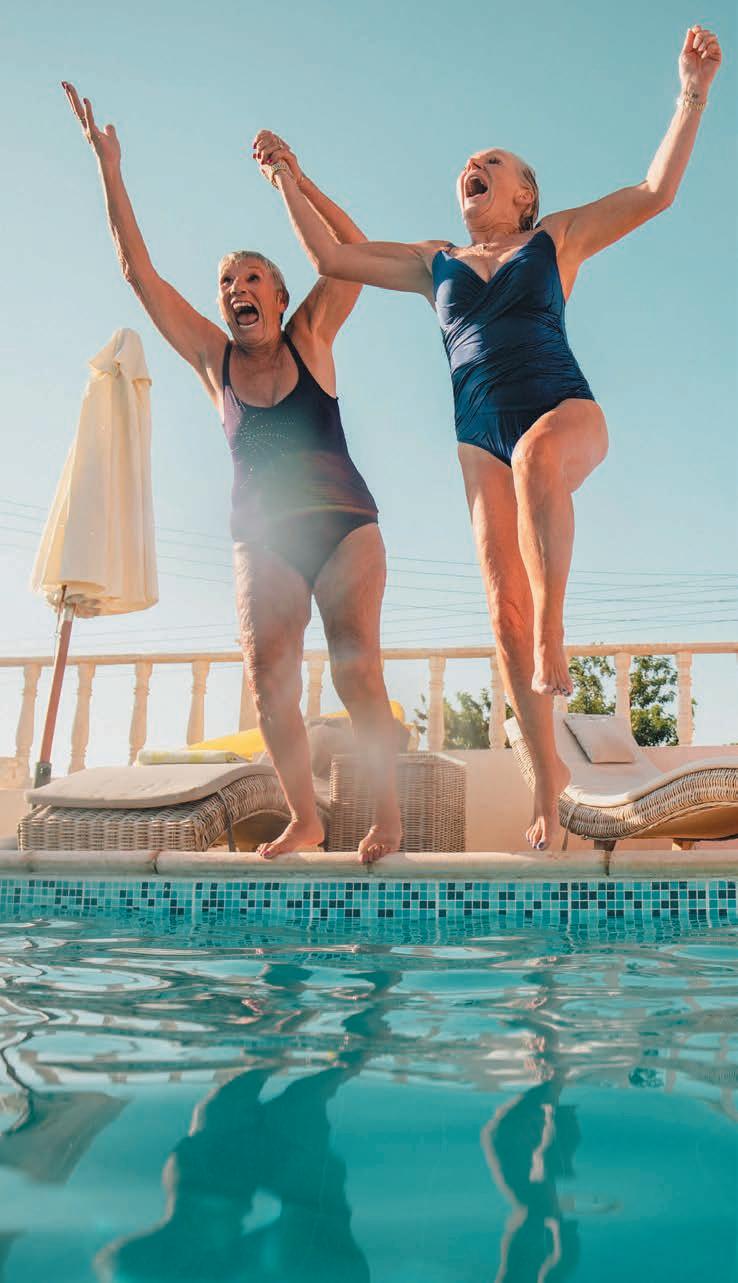
The internet is a great place to research, keep up with friends and family and to stay up to date on current events. It’s important to stay safe while surfing the web and to ensure that our loved ones know how to protect themselves, too. JN








Susan Anable is the Phoenix market vice president for Cox Communications.




















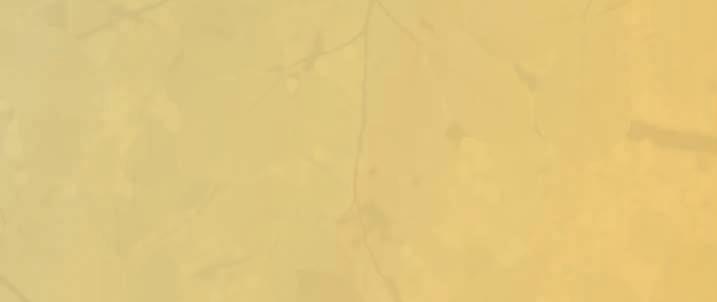
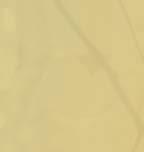
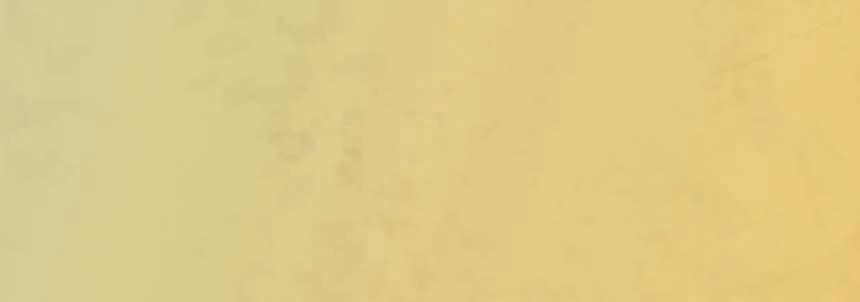
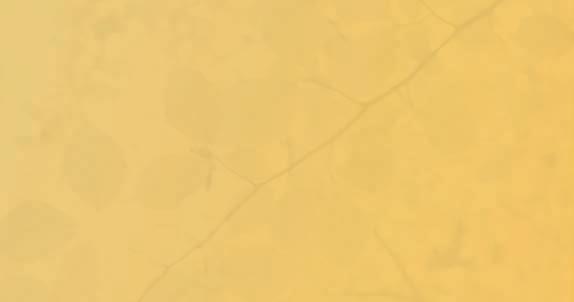




Permanently leaving a domestic abuse situation is so arduous that people attempt it an average of seven times before getting away successfully, according to the National Domestic Violence Hotline. Abuse survivors cite several barriers to escaping a dangerous relationship, including a lack of resources, not knowing where to go, fear of what will happen to their children and the very real threat of increased violence when trying to leave.
One little-recognized factor keeping people with their abusers is the fear of what will become of one or more beloved pets. Nationally, about 45% of abuse victims report that it’s a real obstacle to leaving.
Julie Peterson, co-director of Sojourner Center — a Greater Phoenix organization assisting survivors of domestic violence — knows well how real the issue is and has witnessed the toll it takes on survivors many times during her tenure in working with people fleeing abuse. In fact, it is so common that asking about a pet has become a default part of the intake process.
“For so many years, when survivors and children came in, we would ask if there was a pet in need of safety and if they said yes, we felt we had to find housing for the pet,” Peterson said.
In 2015, Sojourner Center launched its first program to mitigate the issue by dedicating a certain space for pets to be housed and cared for. This month, it broke ground on an expansion project for the pet companion shelter. The center will transform existing emergency shelter rooms and build a larger outdoor dedicated space, so that traumatized people don’t have to leave their pets behind.
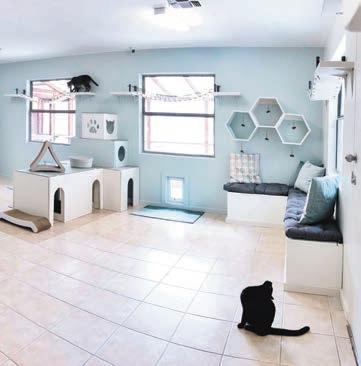
“We have always taken the stance of hearing our survivors and during the last years, they have said, ‘I want a larger space for my animal as well as a dedicated space here,’” Peterson said. “We decided we had the footprint on our campus where survivors don’t have to make the hard choice to leave them behind.”
This addition will not diminish the number of survivors the center is able to serve, she added.
Greater Good Charities, PetSmart Charities, Banfield Foundation, RedRover, Arizona Community Foundation and AKC Humane Fund all provided funding for the expansion.

Founded in 1977, Sojourner Center’s mission is overcoming the impact of domestic violence, one life at a time.
According to the CDC, 1 in 4 women and 1 in 7 men will experience physical violence by their intimate partner at some point during their lifetimes.
Each year, Sojourner Center houses more than 1,000 vulnerable children and adults who have escaped life-threatening situations. It also serves more than 1,000 individuals through mobile advocacy, lay legal services and community education and awareness events.
In 2017, Sojourner Center became a wholly owned subsidiary of Jewish Family & Children’s Services (JFCS). JFCS’ support in securing the center has been instrumental in continuing its mission, said Peterson.
“Our mission really aligns with JFCS.
We have access to a new network of survivors and a greatly expanded network of services,” she added.

“The JFCS vision is a future where families are strong, elders are cared for and children are safe,” said JFCS CEO Dr. Lorrie Henderson. “We strengthen the community by providing behavioral health, health care and social services to all ages, faiths and backgrounds. Sojourner Center is one example of how we support the whole person to build stronger communities, no matter what it takes.”
Only a small percentage of shelters across the country provide for pets. Since Sojourner Center began its pet service, albeit on a smaller scale, in 2015, “we continue to be reminded of the importance of having family members, including their beloved pets, together as they heal,” Peterson said.
After graduating college with a degree in education, Peterson took an internship working with children who were victims of abuse. She said it pulled at her heartstrings and knew it was work where she could make a real impact. That advocacy combined with a master’s
degree in counseling eventually led her to Sojourner Center 15 years ago. She was responsible for the launch of the pet companion shelter.
“When we began the program in 2015, we expected to see the benefit to pet parents but also learned about the benefit to these animals, who witnessed abuse and were targeted in abuse,” she said.
“When families and pets are able to heal together, it reduces the stress in the home so there are benefits all around,” she said.
After so many years running residential programs, Peterson admitted that she had some initial worries about allowing animals into the center, including problems with pet allergies or bad animal behavior, but she quickly learned those issues “are few and far between.” In the last several years they’ve been able to adapt and mitigate any issue that’s arisen, even when it means removing an aggressive pet. They can turn to pet adoption partners such as Lost My Home in Tempe.
“If we have animals that aren’t safe to be here, we can work with our partners to ensure safety for the pets, the community and the family. We are not in this alone,” Peterson said. JN
When her two sons Brandon and Andrew, members of Temple Chai in Phoenix, started to reach adulthood, local single mom Lisa Masters wanted to make sure they had everything they needed for a bright future. However, both of her sons have autism, which made her keenly aware of the lack of supportive services and opportunities for adults with autism.
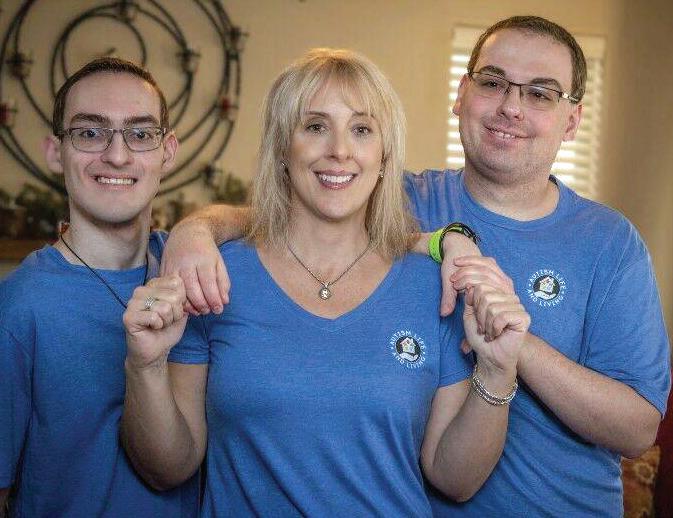
To help others in their shoes, and with the support and encouragement of her sons, Masters founded Autism Life and Living (ALL), a nonprofit organization dedicated to decreasing barriers to accessing needed support services for young adults with autism and related intellectual and developmental disabilities.
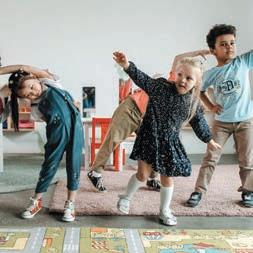
“I was extremely concerned at the lack of support and programs they needed to learn life skills, be included in the community and live in a safe, supported, affordable residence,” Masters said. “I was also shocked at how uninformed policy was in providing long-term support services for my boys and others like them. That’s when I decided I had to do something. Not just for my beautiful boys but for those that are unable to fight for change.”
According to the National Autism Association, autism often looks different from person to person. “Autism impacts the normal development of the brain in the areas of social interaction, communication skills and cognitive function. Individuals with autism typically have difficulties in verbal and non-verbal communication, social interactions and leisure or play activities.”
“People with autism are an extraordinarily diverse group, with a broad range of interests, abilities and experiences,” cites the American Psychological Association. “Approximately 1 in 59 children in the United States is diagnosed with autism,
and each year, more than 60,000 teenagers with autism age out of the school system and launch into adulthood (in the U.S.).”
Exact statistics are hard to come by as autism research is continuously developing, but the National Autism Association states that more than 66% of young adults on the autism spectrum are unemployed or underemployed and not engaged in higher education. Some statistics cite that the number of unemployment or underemployment is closer to 86%. Because of the lack of viable jobs and services, more than one million adults in the U.S. with intellectual and developmental disabilities (such as autism but also including Down syndrome and cerebral palsy) live with an older caregiver and are often at risk for homelessness.
“ALL’s approach is holistic,” said Masters. “Our direct services are designed to empower young adults with autism by providing programs that promote inclusion, independence, socialization and well-being. We host monthly social events in the community and hold classes that teach fitness, nutrition, hygiene and social and emotional skills. ALL’s future goal is to develop a comprehensive lifeskills program and eventually develop a safe, supported and affordable living community.”
Essentially, Masters explained, ALL was born out of her uncertainty of not knowing what would become of her sons when she no longer could take care of them. “I couldn’t sit and wait for our government to take action; I had to do something,” she said.
To reach their goals, ALL is hosting a Roaring 20s Speakeasy Casino Night fundraiser on Sunday, April 23 at 6 p.m. at Kazimierz Wine & Whiskey Bar in Scottsdale. The event includes heavy hors d’oeuvres , signature cocktails, live entertainment by local jazz band Jazzona, casino tables, prizes, a silent auction, photo opportunities and a secret password that is required for entry.
“It (the fundraiser) will be a roaring good time and 100% of the proceeds will
go to support Autism Life and Living’s programs that serve young adults with autism and intellectual/developmental disabilities,” Masters said. “Fundraisers like this help ALL to succeed in our mission of filling in the gaps in support service, building an inclusive community and offering parents some long overdue peace of mind.”
“As a mom of two adults with autism, I want the peace of mind knowing my children will live safe, happy, healthy and independent lives when I am no longer here to care for them,” Masters added. JN
For more information, visit autismlifeandliving. org.
"I WAS SHOCKED AT HOW UNINFORMED POLICY WAS IN PROVIDING LONG-TERM SUPPORT SERVICES FOR MY BOYS AND OTHERS LIKE THEM. THAT’S WHEN I DECIDED I HAD TO DO SOMETHING."
LISA MASTERS




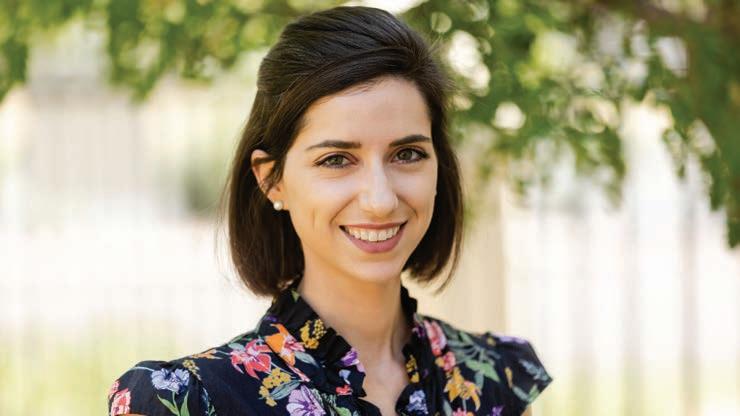
How are you feeling about your finances lately? Between inflation, rising costs of goods due to supply chain challenges and the general state of the economy, money can be an incredibly stressful topic these days. I have spent time wondering where I should cut back to ensure I’m setting my family up for financial success and it’s definitely not an easy task.
Statistically, in times of financial stress, philanthropic gifts are one of the first expenses individuals cut in an effort to save money. On the surface, it makes sense. These are often “gifts of the heart,” not necessities. Many individuals make donations with any “extra” money they have after they’ve covered their basic needs like food, utilities and other less essential but still important items. But, while it is smart to safeguard our personal finances, Judaism also instills in us the value of looking out for others and caring for our community. With this in mind, it’s imperative that we look at charitable giving the same way that we look at saving and investing.
When we choose to make a donation to a nonprofit, we are not only helping others and the world as the Torah instructs us, but we are also safeguarding our own wellbeing. It’s possible that your gift is going straight to work to help that organization provide services to those who need them immediately. Your contribution may also be helping to compensate the staff who work tirelessly for our community, ensuring that they can meet their own basic needs. As time goes on, annually or bi-annually making these gifts becomes more like an investment in your own future. As you put money into charitable causes, you are ensuring that these organizations can continue to thrive in the harshest of economies. Your own family may very well need that type of investment down the line.
Having worked, and now as a volunteer, for Jewish Free Loan, I have had numerous encounters with local individuals and families who generally never faced financial distress until all of a sudden, they did. So many people utilizing the services of nonprofits all around the
Greater Phoenix area never thought they would be in a position to need assistance until one small decision or something out of their control turned their finances upside down. “I never thought it could happen to me,” is a common phrase I’ve heard throughout my career as a nonprofit professional. I’ve also heard, “I’m so happy this organization exists,” or “I’m so grateful for this community.”
As we head into tax season, please consider making a charitable contribution to an organization that is important to you.
Whether the donation is made for general support or to take advantage of the Arizona Charitable Tax Credit, your generosity will impact the local community and potentially safeguard your own future. Together, we can use this time of year, and the end of the calendar year, as a chance to assess how we can better support the community as a whole and thus support our own friends and families for years to come. JN
Children’s Cancer Network supports children and families throughout their cancer journey with programs and services designed to provide financial assistance, promote education, encourage healthy lifestyles, and create an awareness of issues they face related to childhood cancer.
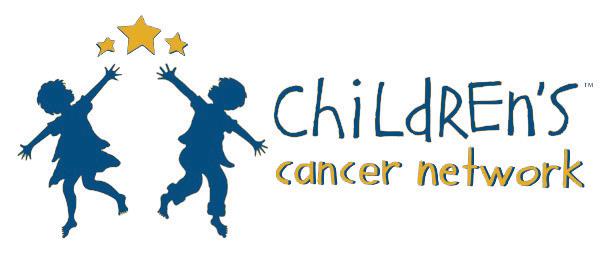

Serving over 800 families annually, Children’s Cancer Network strives to address the highest priority needs just when they are needed most. Our intention is for each family to realize they are not alone in their fight. Giving hope to Arizona’s children and families is our goal.
Make a di erence today by choosing Children’s Cancer Network for your charitable tax credit donation.
$400 for those that file as individuals and $800 for those who file jointly will be returned to you, dollar for dollar, on your Arizona State Taxes.
Questions? Contact Patti Luttrell at Patti.luttrell@childrenscancernetwork.org or 602-717-9139 | childrenscancernetwork.org
Donate today at childrenscancernetwork.org/donate
The staff of Menachem Mendel Academy in Scottsdale creates action plans, sets goals and refreshes its passion for the work ahead during professional development days.
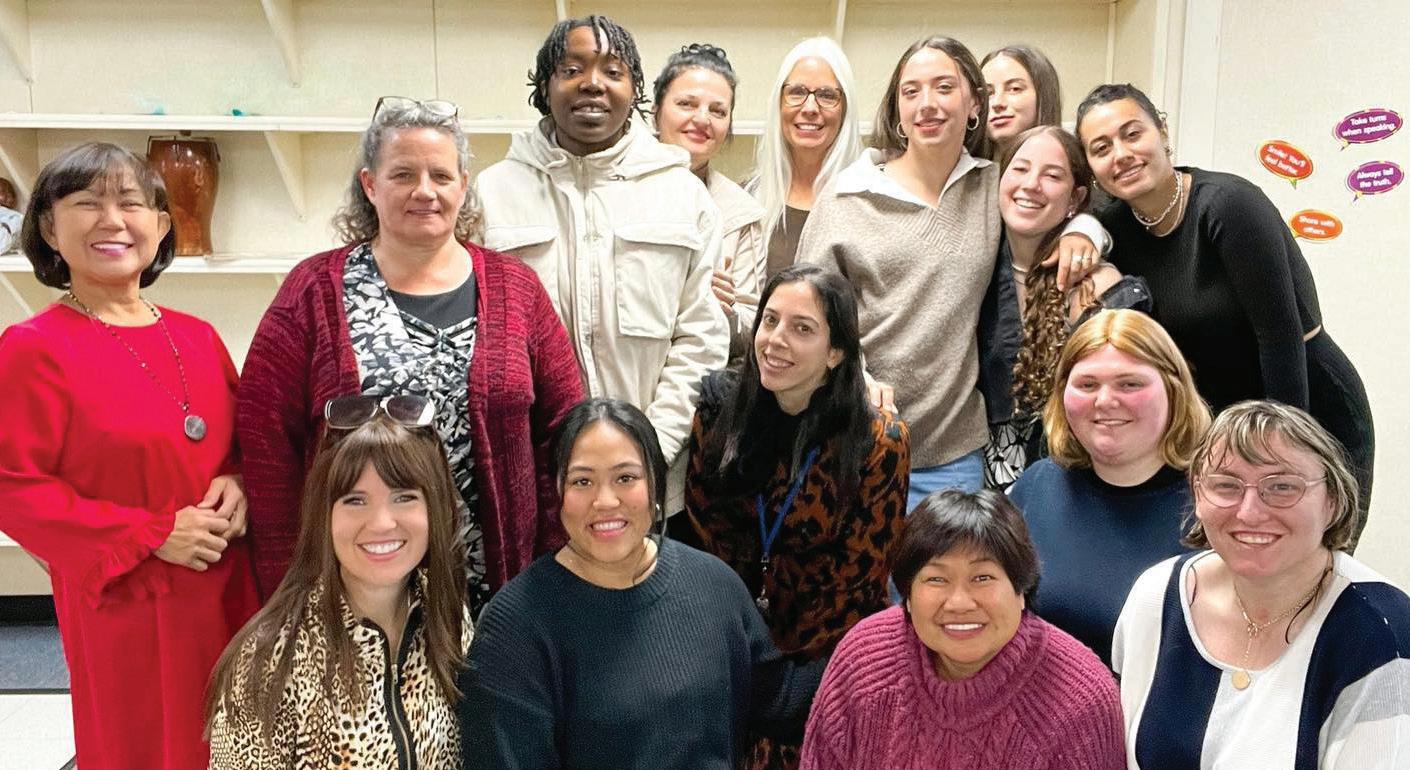
Anthony Fusco, education director at the Arizona Jewish Historical Society, right, presents a certificate to Dr. Nathan Laufer for his work to support the organization. COURTESY OF JOEL

Jewish War Veterans Post 619 members accept donations of clothing for male and female veterans experiencing homelessness to be housed at U. S. Vets in Phoenix. Pictured from left, Elliott and Barbara Reiss and Rhonda Berns.

OF JEWISH WAR VETERANS POST 619
Phoenix Mayor Kate Gallego spoke to Chabad at Arizona State University students about being a Jewish mayor, inclusion and overcoming antisemitism.

Temple Solel partied on Purim, starting with a Megillah reading and followed by an enchilada dinner with margaritas and sangria, carnival games, sundae bar and costume parade. Festivities wrapped up with a Purim spiel showcasing the story of Esther with a Disney “Encanto” theme.
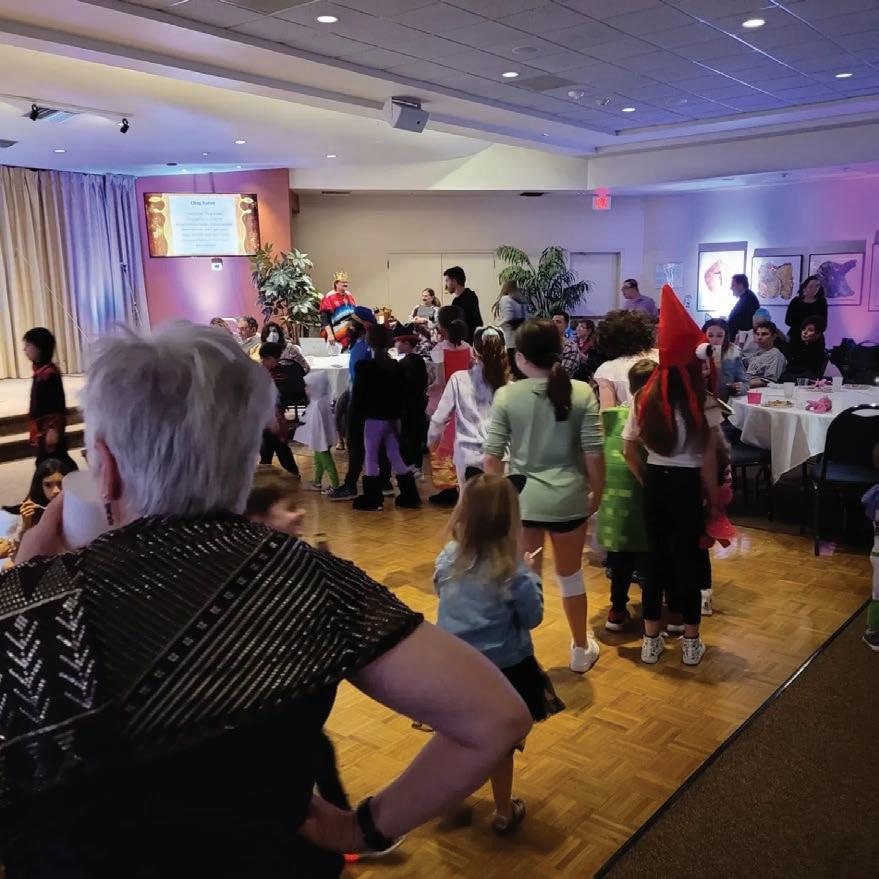

Times vary. Online and at Arizona State University, 1151 S. Forest Ave., Tempe. This week-long event features a series of lectures, exhibits and storytelling by survivors, scholars, politicians, activists, artists, humanitarians and members of law enforcement. Cost: Free. For more information, visit shprs.asu.edu/gaw2023.

FRIDAY, APRIL 7
Fran Lebowitz: 8 p.m. Virginia G. Piper Theater at Scottsdale Center for the Performing Arts, 7380 E. Second St., Scottsdale. Join Fran Lebowitz for a night of comedic storytelling. Cost: $35-$65. For more information, visit scottsdaleperformingarts.org/events.
SUNDAY, APRIL 9
USY Glass Mezuzah Workshop: 11 a.m.-1 p.m. Art for Fun Studio, 3508 N. Seventh St. #115 South, Phoenix. Students in grades 6-12 are invited to create a fused glass mezuzah. Cost: Free. For more information or to RSVP, contact rharmon@bethelphoenix.com.
MONDAY, APRIL 10 & TUESDAY APRIL 11
Spring Break Youth Philanthropy
Bootcamp: 9 a.m.-3 p.m. Ina Levine Jewish Community Campus, 12701 N. Scottsdale Road, Scottsdale. Join the Center for Jewish Philanthropy of Greater Phoenix for a program designed for middle school students looking to engage as leaders and philanthropists. The program will focus on hands-on service, group decision making, leadership and Jewish values. Cost: $180. For more information, contact Andrea Cohen at acohen@phoenixcjp.org or 480-481-1784.
TUESDAY, APRIL 11
Bioethics in the Shadow of the Holocaust: 12-1 p.m. Online and in person at Arizona State University, 976 S. Forest Mall, Room 4403, Tempe. Join ASU’s Jewish Studies and Valley Beit Midrash for a presentation by Nadav Davidovitch. Cost: Free. For more information, visit jewishstudies.asu.edu.
FRIDAY, APRIL 14
Phoenix Rising: 100 Years of Jazz in 100 Minutes: 7:30 p.m. Mesa Arts Center, One E. Main St., Mesa. Join bassist Alan Lewine’s sextet as they perform jazz hits from the last 100 years. For more information, visit mesaartscenter.com.
SUNDAY, APRIL 16
JSERVE 2023: Jewish Teens Making The World A Better Place: 12:30-3 p.m. Ina Levine Jewish Community Campus, 12701 N. Scottsdale Road, Scottsdale. Join other teens for an afternoon of community service at this JSERVE event. Teens in grades 7-12 are invited to help build, create, clean and organize as a way of helping local Jewish nonprofit organizations. Cost: Free. For more information, contact Andrea Cohen at 480-481-1784.
Yom HaShoah Community-Wide
Commemoration: 3-5 p.m. Congregation
Beth Israel, 10460 N. 56th St., Scottsdale. Join the Phoenix Holocaust Association for its annual event featuring one of two concurrent sessions followed by a commemoration program including a procession of survivors, candle lighting in memory of the 6 million, presentation of the Shofar Zakhor Awards to recognize those who educate the community about the Holocaust and musical pieces organized by Cantor Seth Ettinger. Cost: Free; registration required. For more information, visit phxha.com.
MONDAY, APRIL 17
The Ins and Outs of Artificial Intelligence:
5:30-7 p.m. Ina Levine Jewish Community Campus, 12701 N. Scottsdale Road, Scottsdale. Join the Center for Jewish Philanthropy’s Business & Professionals network for an interactive discussion with experts about the latest trends in artificial intelligence, like ChatGPT, and the ethics of using AI in your business and personal lives. Cost: $18 per person. For more information, contact Jennifer Starrett at jstarrett@ phoenixcjp.org.
Yom HaShoah Commemoration: 6 p.m. East Valley Jewish Community Center, 908 N. Alma School Road, Chandler. Join the EVJCC for refreshments at 5:30 p.m., “Voices Silenced: Music from the Holocaust,” a lecture-recital featuring music by composers killed during the Holocaust, survivor testimony by Dirk Van Leenen and a candlelighting ceremony with representatives from the City of Chandler and local faith leaders. Cost: Free; registration required. For more information, visit evjcc.org/yomhashoah.
Yom HaShoah: 7-8 p.m. Temple B’rith Shalom, 2077 Brohner Way, Prescott. Join the community for a program and service, Cost: Free. For more information, visit brithshalom-az.org.
SUNDAY, APRIL 23
Yom Ha’atzmaut in the Park: 10-11:30 a.m. Location provided after registration. Join the East Valley Jewish Community Center’s Early Learning Center for a Yom Ha’atzmaut event celebrating Israel’s 75th birthday. For more information, visit evjcc.org/ jcommunity.
An Afternoon with Lan and Joy: 2 p.m. Gloria Christi Federated Church, 3535 E. Lincoln Dr., Paradise Valley. Join Beth Ami Temple for a concert featuring violinists Lan Qiu and Joy Pan. Cost: $36 per person. For more information, call 602-956-0805 or visit bethamitemple.org.
Leadership Tea: 3 p.m. Address provided upon registration. Join the Phoenix Women’s Division of American Friends of Magen David Adom for an event featuring Lizzy Savetsky, a social media fashion influencer, who in recent years has taken an active role in speaking out about increasing antisemitism in the United States and throughout the world. Stacie Brockman, an award-winning brand builder, journalist, entrepreneur and investor will serve as the interviewer. Cost: $108 adults, $54 ages under 21. For more information, visit afmda. org/lizzy-arizona.
The Rabbi Slurps Spaghetti: 3:30-5:30 p.m. Pardes Jewish Day School, 12753 N. Scottsdale Road, Scottsdale. Join PJ Library and Pardes Jewish Day school to cheer on your favorite rabbi (or representative) while they slurp up spaghetti for a good cause! Crafts, activities and a spaghetti dinner will be provided. Cost: Free. For more information, visit pardesschool.org/ spaghetti-registration/.
MONDAY, APRIL 24
Yom Hazikaron-Israel Memorial Day: 6:30-8:30 p.m. Congregation Beth Tefillah, 6529 E. Shea Blvd., Scottsdale. Join Shevet Shemesh for a community observance to honor the lives of Israel’s fallen soldiers and victims of terror. Cost: Free. For more information, visit bit.ly/ IsraelMemorialDay2023.
TUESDAY, APRIL 25
Celebrate Chai: 5:15-7 p.m. Ina Levine Jewish Community Campus, 12701 N. Scottsdale Road, Scottsdale. Join the Minkoff Center for Jewish Genetics in celebrating their 18th year in the Greater Phoenix area. Learn about their programs and honor the 2021 and 2022 Sherman Minkoff Mensch Award recipients Seymour Rife, MD and Katherine Hunt Brendish, PhD, CGC. Cost: $36. For more informaiton, visit jewishgeneticsaz.org.
THURSDAY, APRIL 27
AJLA Holocaust CLE: 5:30-8 p.m. Temple Kol Ami, 15030 N. 64th St., Scottsdale. Join the Arizona Jewish Lawyers Association for a continuing opportunity for legal learning. Please bring a non-perishable food item for Arizona Kosher Pantry. Space is limited, RSVP required. For more information, contact azjewishlawyers@gmail.com.
SUNDAY, APRIL 30
Israel at 75 Community-Wide Celebration: 2-5 p.m. Valley of the Sun Jewish Community Center, 12701 N. Scottsdale Road, Scottsdale. Join nearly 50 local Jewish organizations for this celebration. Event features food trucks, vendor fair, live music, beer garden, arts & crafts, children’s
activities and more. For more information, visit vocjcc.org/israel75.
SUNDAYS
B.A.G.E.L.S: 9-11 a.m; last Sunday of the month. Valley of the Sun Jewish Community Center, 12701 N. Scottsdale Road, Scottsdale. Grab a bagel and a cup of coffee at Bagels And Gabbing Every Last Sunday and enjoy some time with your friends and make new ones. You must register to attend. Bagels and coffee will be provided. Cost: Free for members, $5 for guests. For more information and to register, visit vosjcc.org.
WEDNESDAYS
Mahjong: 1-3:30 p.m. East Valley Jewish Community Center, 908 N. Alma School Road, Chandler. Come play mahjong each week. For all levels. Free; registration required at evjcc.org/mahjong.
THURSDAYS
Storytime at Modern Milk: 9:30 a.m. Modern Milk, 13802 N. Scottsdale Road, #163, Scottsdale. Storytime for babies, toddlers and preschoolers. Integrates children’s books and songs while giving parents new ideas for play. Cost: $5. For more information and to register, visit modernmilk.com/after-baby.
SUNDAYS Chassidus Class: 9 a.m. Online. Learn about the Chasidic movement with Rabbi Yossi Friedman. Cost: Free. For more information, visit chabadaz.com.
Jewish War Veterans Post 210: 10 a.m. Online. Any active duty service member or veteran is welcome to join monthly meetings, every third Sunday. Cost: Free. For more information, email Michael Chambers at c365michael@yahoo.com.
Anxiety in the Modern World: 6 p.m. Online. Learn the secrets of the Torah for living stress-free in the current environment with Rabbi Boruch of Chabad of Oro Valley. Cost: Free. Tune in using this link: zoom. us/j/736434666. For more information, visit chabadaz.com.
MONDAYS
Ethics of Our Fathers: 7 p.m. Online. Learn with Rabbi Zalman Levertov. Tune in at: bit.ly/2Y0wdgv. Cost: Free. For more information, visit chabadaz.com.
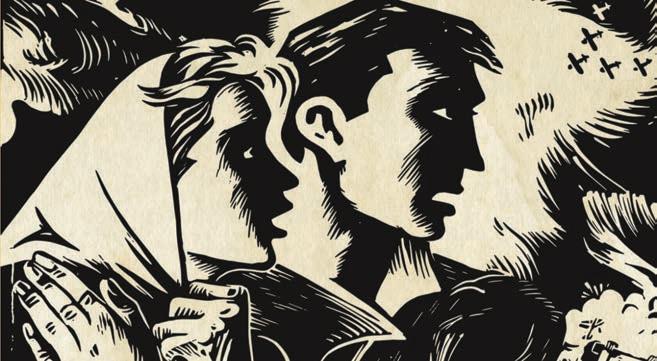
Quotable Quotes by our Sages: 7 p.m. Online. Learn with Rabbi Shlomy Levertov. Tune in at: JewishParadiseValley.com/ class. Cost: Free. For more information, visit chabadaz.com.
Partners in Torah: 7:30 p.m. Online. Join a growing group of inspired learners with Project Inspire. Cost: Free. Tune in at: us04web.zoom. us/j/3940479736#success, password is 613. For more information, email Robin Meyerson at robin@projectinspireaz.com.
Learning to Trust in God: 7:30 p.m. Online. Learn with Rabbi Yossi Friedman. Tune in at: ChabadAZ.com/LiveClass. Cost: Free. For more information, visit chabadaz.com.
Torah & Tea: 7:30 p.m. Online. Learn with Rabbi Yossie Shemtov. Cost: Free. For more information, visit Facebook.com/ ChabadTucson.
TUESDAYS
Tuesdays at the J: 10-11:30 a.m. East Valley Jewish Community Center, 908 N. Alma School Road, Chandler. Join individuals and couples age 55 plus for presentations on a variety of topics. Cost: Free; registration required. For more information, visit evjcc. org/tuesdays.
Let’s Knit: 1:30 p.m. Ina Levine Jewish Community Campus, 12701 N. Scottsdale Road, Scottsdale. Share the pleasure of knitting, crocheting, etc. outside the social hall in the campus. Can’t knit? We can teach you! Every level welcome. Cost: Free. For more information, visit vosjcc.org.
Maintaining an Upbeat Attitude: 7 p.m. Online. A class exclusively for people in their 20s and 30s, learn how Jewish Mysticism can help with your attitude with Rabbi Shlomy Levertov. Cost: Free. Tune in at: JewishParadiseValley.com/YJPclass. For more information, visit chabadaz.com.
WEDNESDAYS
History of the Jews: 11 a.m. Online. Learn the Jewish journey from Genesis to Moshiach with Rabbi Ephraim Zimmerman. Cost: Free. Tune in here: zoom.us/j/736434666. For more information, visit chabadaz.com.
Torah Study with Temple Beth Shalom of the West Valley: 11 a.m.-12:30 p.m. Online. Weekly study group explores that week’s portion and studies different perspectives and debates the merits of various arguments. Intended for adults, Torah study is open to students of all levels. For more information, contact the TBS office at 623-977-3240.
Happiness Hour: 11:30 a.m. Online. Class taught by Rabbi Pinchas Allouche that delves into texts and references culled from our traditions to address a relevant topic. For more information or to join, visit cbtvirtualworld.com.
Torah Study with Chabad: 12 p.m. Online. Take a weekly journey of Torah with Rabbi Yossi Levertov. Cost: Free. For more information, visit chabadaz.com.
Lunch & Learn: 12:15 p.m. Online. Grab some food and learn with Rabbi Yehuda Ceitlin. Cost: Free. Get Zoom link by emailing info@ chabadtucson.com. For more information, visit chabadtucson.com.
The Thirteen Petalled Rose: 1 p.m. Online. Kabbalah class that studies “The Thirteen Petalled Rose” by Rabbi Adin Even-Israel Steinsaltz, focusing on the many concepts of Kaballah and Jewish Mysticism and applying
them to everyday life. For more information or to join, visit cbtvirtualworld.com.
JACS: 7:30-8:30 p.m. Valley of the Sun Jewish Community Center, 12701 N. Scottsdale Road, Scottsdale. In person and via Zoom support group for Jewish alcoholics, addicts and their friends and family on the first and third Wednesdays of the month. Cost: Free. For more information, email jacsarizona@gmail.com or call 602692-1004.
Words & Whiskey: 8:30 p.m. Online. Learning session for men. Cost: Free. To RSVP, email rmollenaz@gmail.com or call/ text 310-709-3901.
THURSDAYS
Baby University: 6:30-9 p.m. Ina Levine Jewish Community Campus, 12701 N. Scottsdale Road, Scottsdale. Join the Bureau of Jewish Education of Greater Phoenix and local synagogues for an informative program for expectant parents combining preparation for childbirth plus parenting for the Jewish family. April 13-May 18. For more information, contact Linda Feldman at lindaf@bjephoenix.org or 480-634-8050.
Ladies Torah & Tea: 10:30 a.m. Online. Learn about the women of the Torah with Mrs. Leah Levertov. Cost: Free. Tune in at: ourjewishcenter.com/virtual. For more information, visit chabadaz.com.
Talmud - Maakos: 11 a.m. Online. Learn with Rabbi Shlomy Levertov. Cost: Free. Tune in at: JewishParadiseValley.com/YJPclass. For more information, visit chabadaz.com.
Mindfulness Gatherings: 12 p.m. Online. Hosted by Hospice of the Valley via Zoom. Cost: Free. To join by phone, dial 1-253-2158782, meeting ID 486 920 2119#, to get the Zoom link or for further questions contact Gill Hamilton at ghamilton@hov.org or 602-748-3692.
The Science of Everything: 4 p.m. Online. Explore the most fundamental work of Chassidut: the Tanya, with Rabbi Boruch. Cost: Free. Tune in at: zoom. us/j/736434666. For more information, visit chabadaz.com.
Teen Discussions: 7-8:30 p.m. Online. Learn with Rabbi Tzvi Rimler. Cost: Free. Tune in at cteen.clickmeeting.com/east-valley. For more information, visit chabadaz.com.
SATURDAYS
Saturday Mindfulness Gatherings: 9:30 a.m. Online. Hosted by Hospice of the Valley. To join by phone, dial 1-253-215-8782, meeting ID 486 920 2119#. To get the Zoom link or for more information, contact Gill Hamilton at ghamilton@hov.org or 602-748-3692.
Middle Eastern Percussion - Beginner
Level: 12:45-1:45 p.m. One World Dance and Music Studio, 3312 N. Third St., Phoenix. Learn the fundamentals of Middle Eastern rhythms on tabla/doubek (drum), riq (tambourine) and zills (finger cymbals). Cost: $20 per class. For more information, visit oneworlddanceandmusic.com.
Book Discussion: 1:30-2:30 p.m. Online. Join Or Adam Congregation for Humanistic Judaism on the third Saturday of every month for a book discussion. For more information and to register, contact oradaminfo@gmail.com.
FRIDAYS
Shabbat in the Park: 10-11 a.m. Cactus Park, 7202 E. Cactus Road, Scottsdale. Join the Bureau of Jewish Education of Greater Phoenix monthly for music, parachute play, crafts and a family Shabbat experience. For more information, visit bjephoenix.org.
Welcome Shabbat: 11-11:30 a.m. Online. Celebrate Shabbat with the JFCS Virtual Center for Senior Enrichment. Each week a different guest host will lead the program with song and celebration. Cost: Free. For more information, visit jfcsaz.org/cse.
Shabbat at Beth El: 11-11:45 a.m. Beth El Phoenix, 1118 W. Glendale. Ave., Phoenix. Celebrate Shabbat with songs, blessings and teachings with Rabbi Stein Kokin the first Friday of every month. Special guests will be welcoming Shabbat during the remainder of the month. For more information or to join, visit bethelphoenix.com.
Erev Shabbat Service: 5:30 p.m. Online. Rabbi Alicia Magal will lead a service livestreamed for members of the Jewish Community of Sedona and the Verde Valley. Cost: Free. For more information and to obtain the Zoom link, visit jcsvv.org/contact.
Shabbat Services: 5:30 p.m. nosh, 6:15 p.m. service; morning varying dates and times. Temple Chai, 4645 E. Marilyn Road, Phoenix. For more information, contact Sheana Abrams at (602) 971-1234 or sabrams@ templechai.com.
Pre-Shabbat Kiddush Club: 6 p.m. Online. Say Kiddush with Rabbi Mendy Levertov. Cost: Free. Tune in here: ourjewishcenter. com/virtual. For more information, visit chabadaz.com.
Shabbat Services: 6 p.m; 9:30 a.m. Congregation Or Tzion, 16415 N. 90th St., Scottsdale. Services are also live streamed at otaz.org/livestream. For more information about services, events and membership, visit congregationortzion.org or call 480-342-8858.
Shabbat Services: 6:15 p.m; 10 a.m. Congregation Beth Israel, 10460 N. 56th St., Scottsdale. Services held in the Goldsmith Sanctuary. Participants must pre-register by Thursday at 5 p.m. Priority will be given to members first and then guests. If there are more requests than available seats a lottery system will be used. For more information or to make a reservation, visit cbiaz.org/ shabbat-services.
Kabbalat Shabbat and/or Shabbat morning service: 6:30 p.m.; 10 a.m.; dates vary. Congregation Kehillah, 5858 E. Dynamite Blvd., Cave Creek. Join Rabbi Bonnie Sharfman and cantorial soloists Erica Erman and Scott Leader either in person or via Zoom. For safety reasons, please register ahead of time. For dates, visit congregationkehillah.org/event/. Register by emailing info@congregationkehillah.org.
Third Friday Shabbat: 7-9 p.m. Group meets at a North Scottsdale location. The Desert Foothills Jewish Community Association hosts a Shabbat service followed by a program. Contact Andrea at 480-664-8847 for more information.
Shabbat Services with Sun Lakes: 7 p.m. Sun Lakes Chapel, 9240 E. Sun Lakes Blvd. North, Sun Lakes. Sun Lakes Jewish Congregation conducts services on the second Friday of the month. For more information, contact 480-612-4413.
Shabbat Services with Beth Ami Temple: 7:30 p.m. Gloria Christi Federated Church, 3535 E. Lincoln Dr., Paradise Valley. Rabbi Alison Lawton and Cantorial Soloist Michael Robbins lead Shabbat services twice a month. Beth Ami welcomes people who are not affiliated and looking for a spiritual connection. For more information, visit bethamitemple.org. JN

JOEL LESLIE RUBEN
Joel Leslie Ruben of Phoenix died on March 20, 2023. He was 79.
He was born in Chicago, Illinois on Sept. 13, 1943, and was affiliated with the Arizona Association of Certified Public Accountants.
Joel is survived by his wife, Marilyn; daughters Rachael Barkley and Amy Reichgott (Martin); sisters Naomi Karen “Nikki” Krinkin (Boaz) of Jerusalem, Israel and Roberta Lynne Ruben of Springfield, Illinois; and granddaughter, Samantha Byrd. He was preceded in death by his parents Abe and Celia Pruzansky Kahn.
Services were held on March 23, 2023 in Waldheim Cemetery in Chicago and officiated by Rabbi Louis Lazovsky. A memorial will be held in Phoenix on April 23, 2023, for details email rachaelbarkley1@gmail.com.
Donations in his name can be made to the Leukemia & Lymphoma Society (lls.org). JN
For sale: one plot in a semi-private estate in the original Jacob Section of the cemetery (Jewish only allowed).

Has been upgraded to companion (burial for 2) space. Includes granite bench on adjacent space with name engraved. jarpell@yahoo.com
For sale: 1 Companion Plot Solomon Section
Burial plot for 2 people and: Stone Monument, 2 engravings, 2 open and close fees, Concrete vault liner, Full Perpetual care.
Original cost $15,105.79
Will accept best o er.
abbey@goldbergaz.net


















